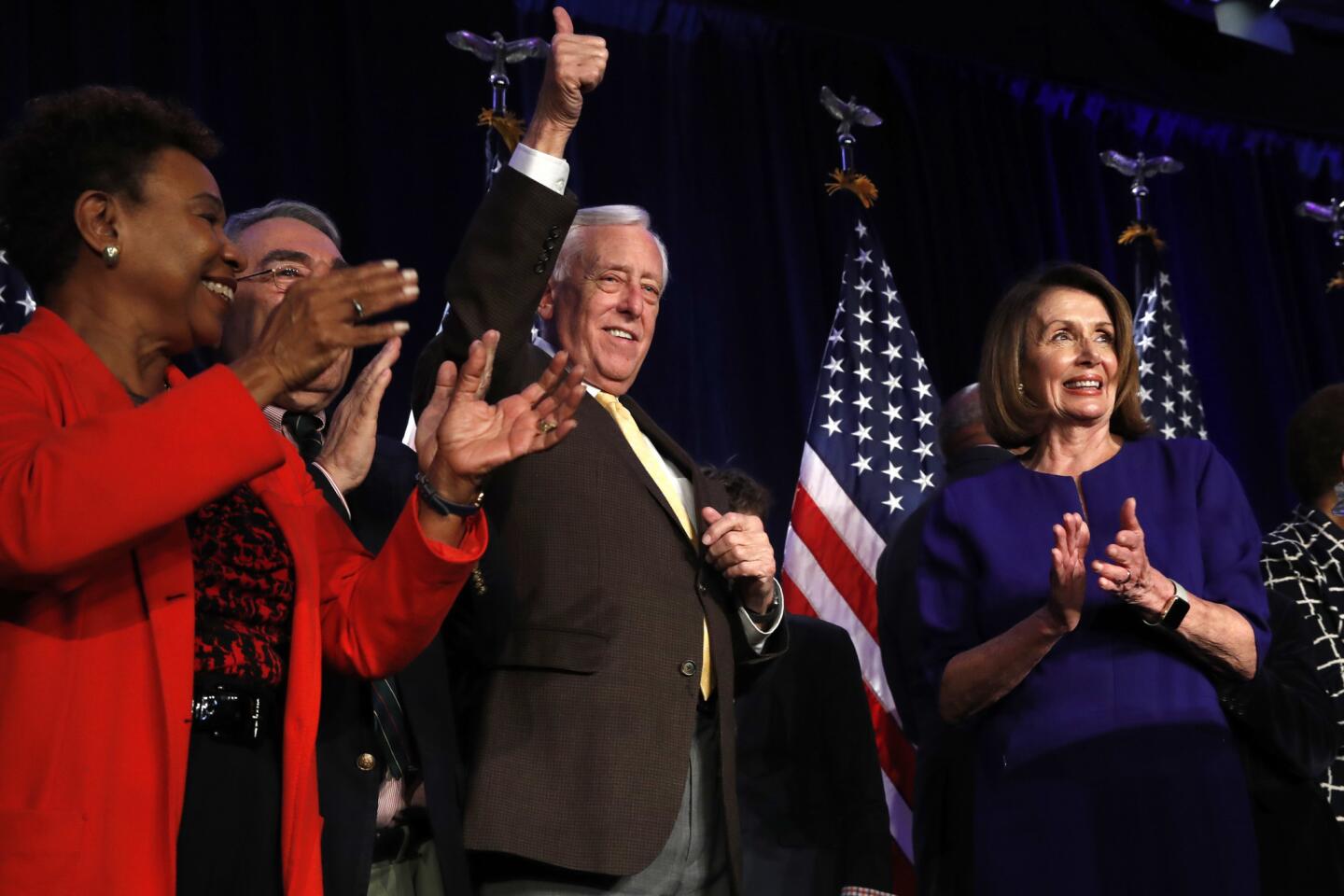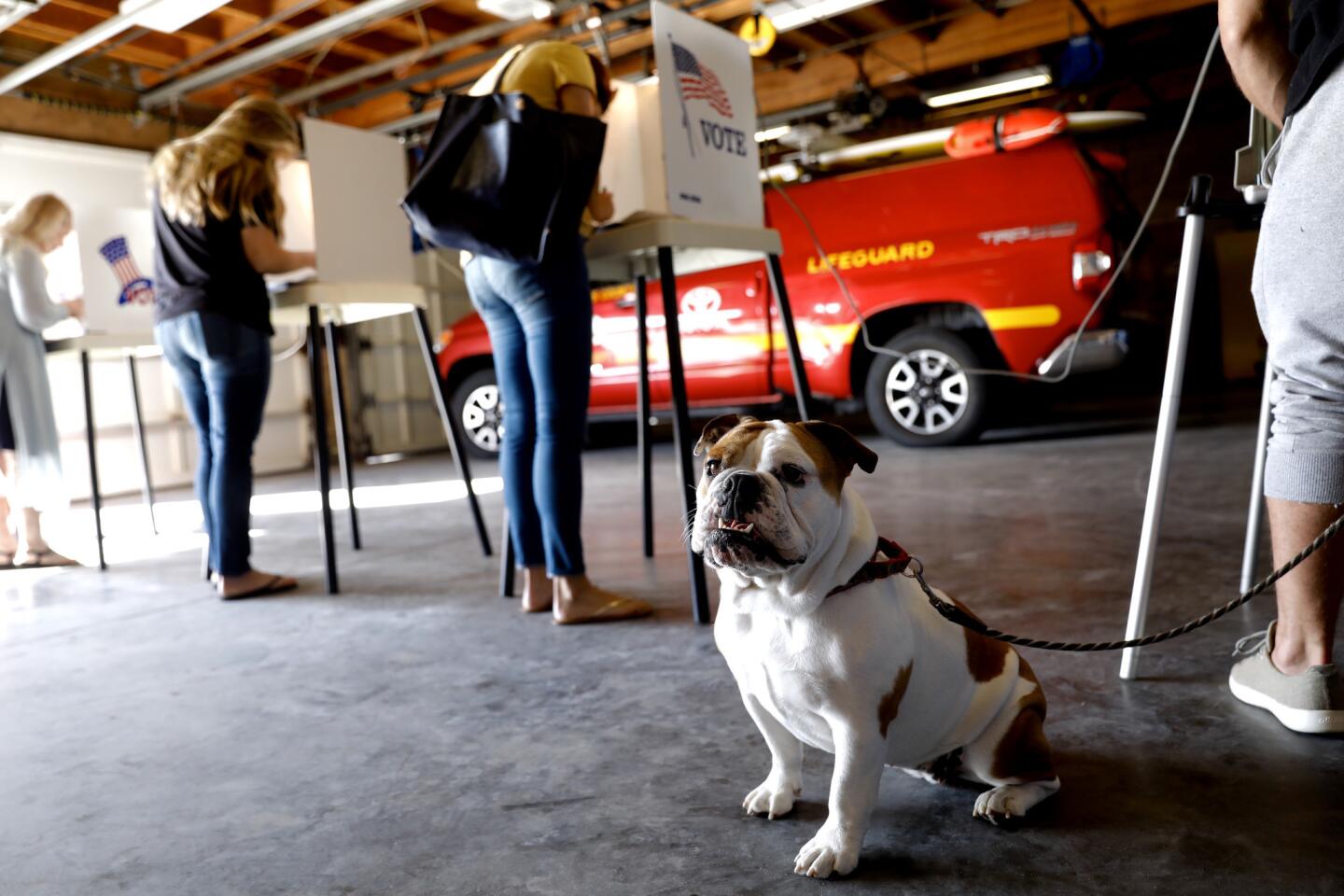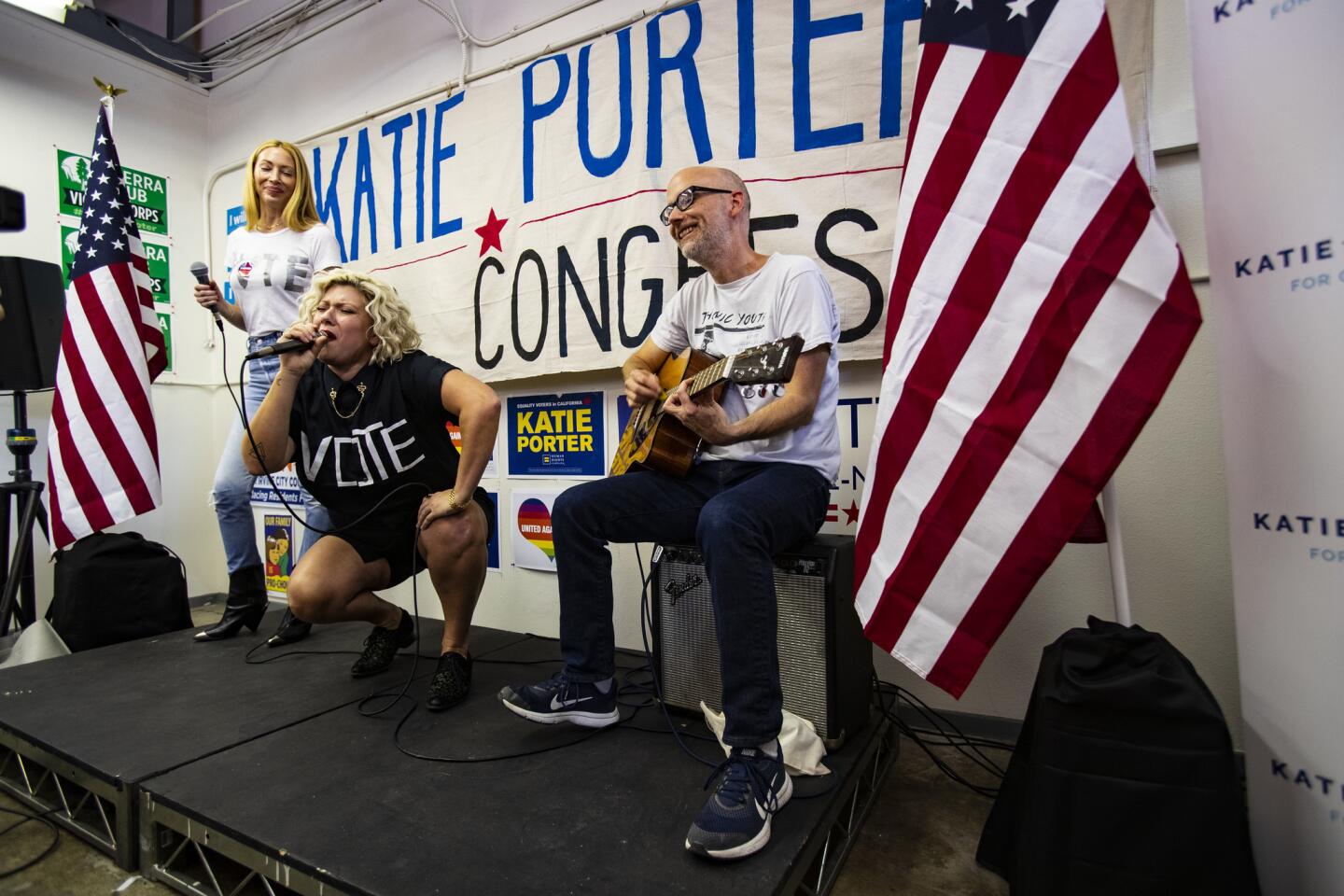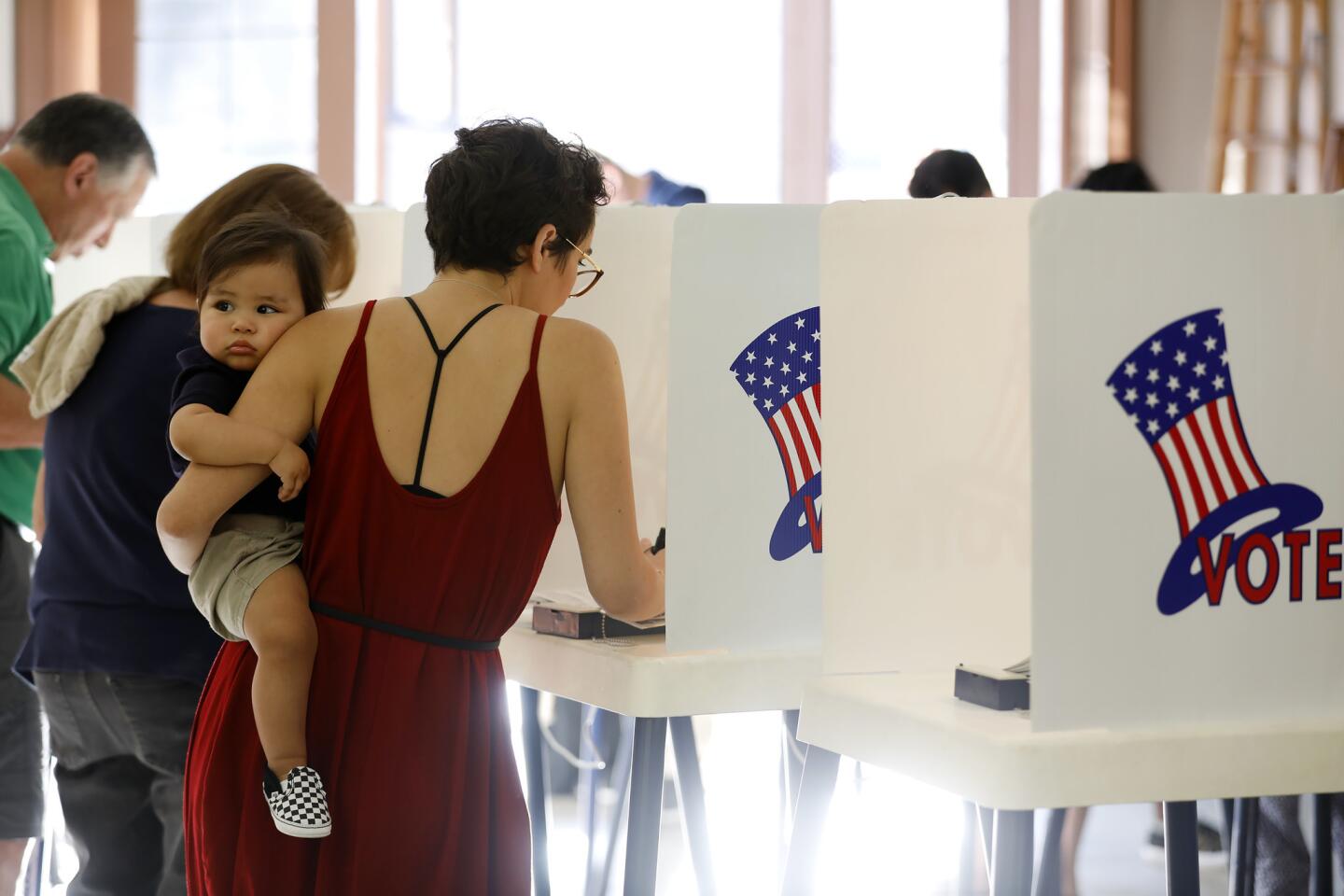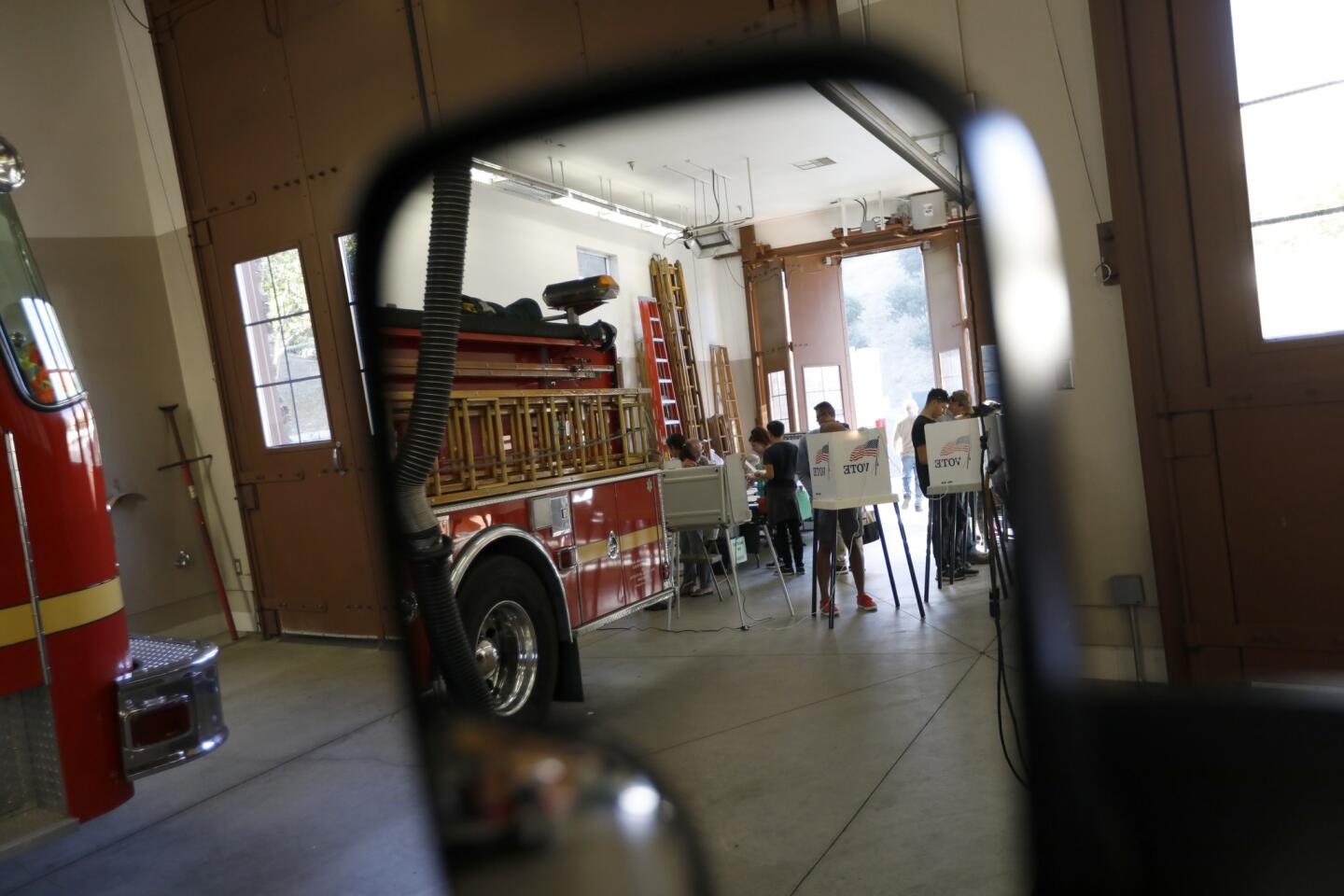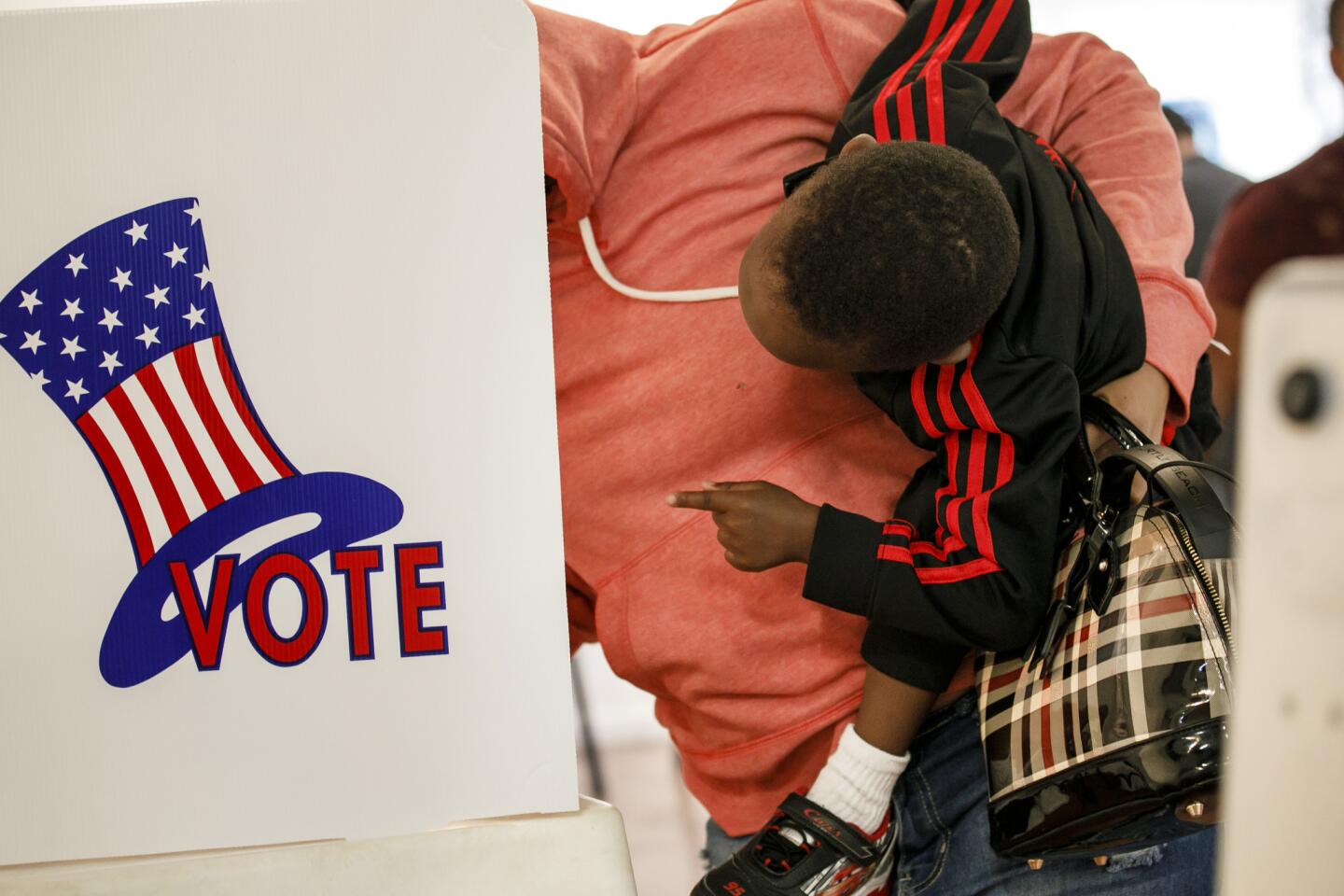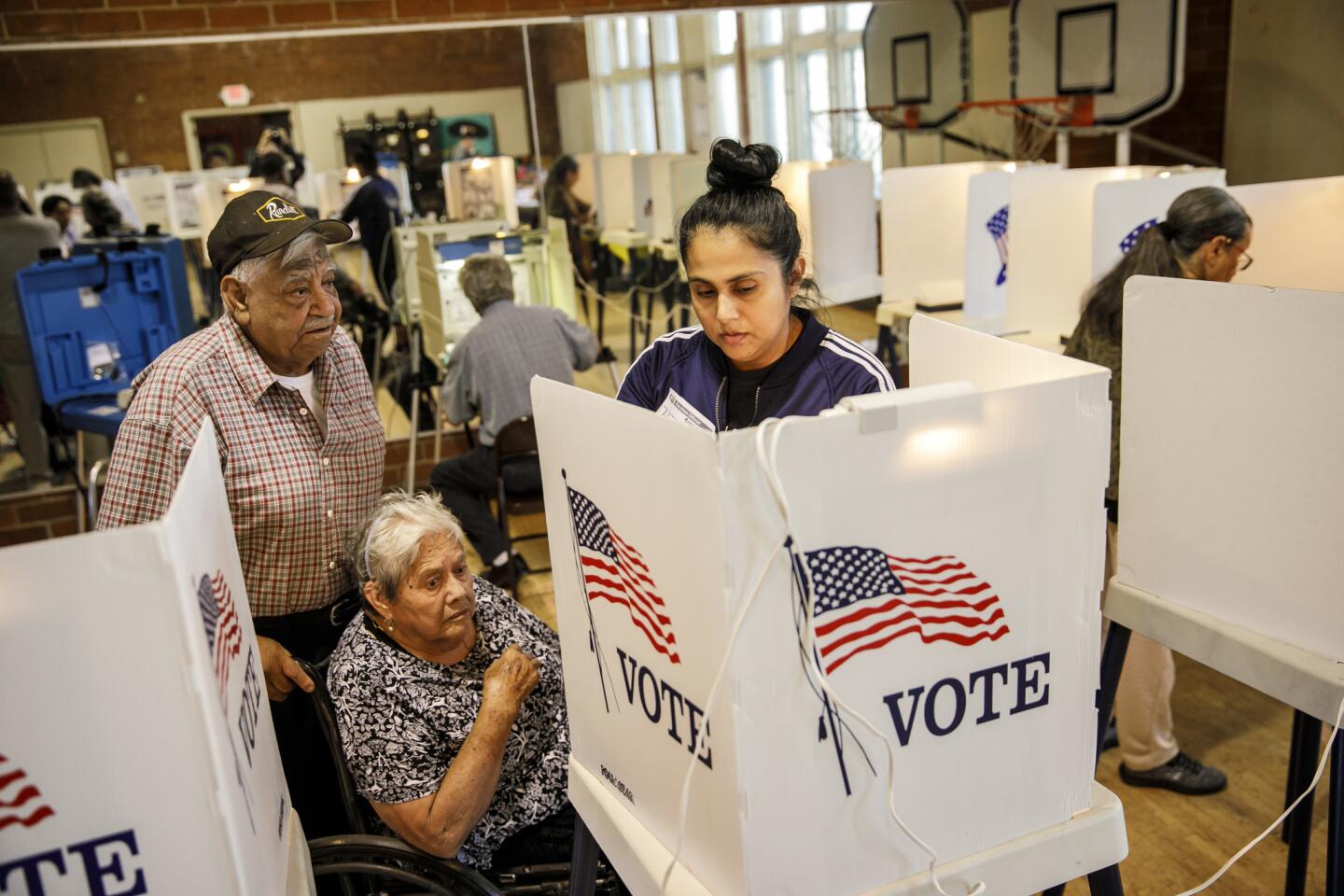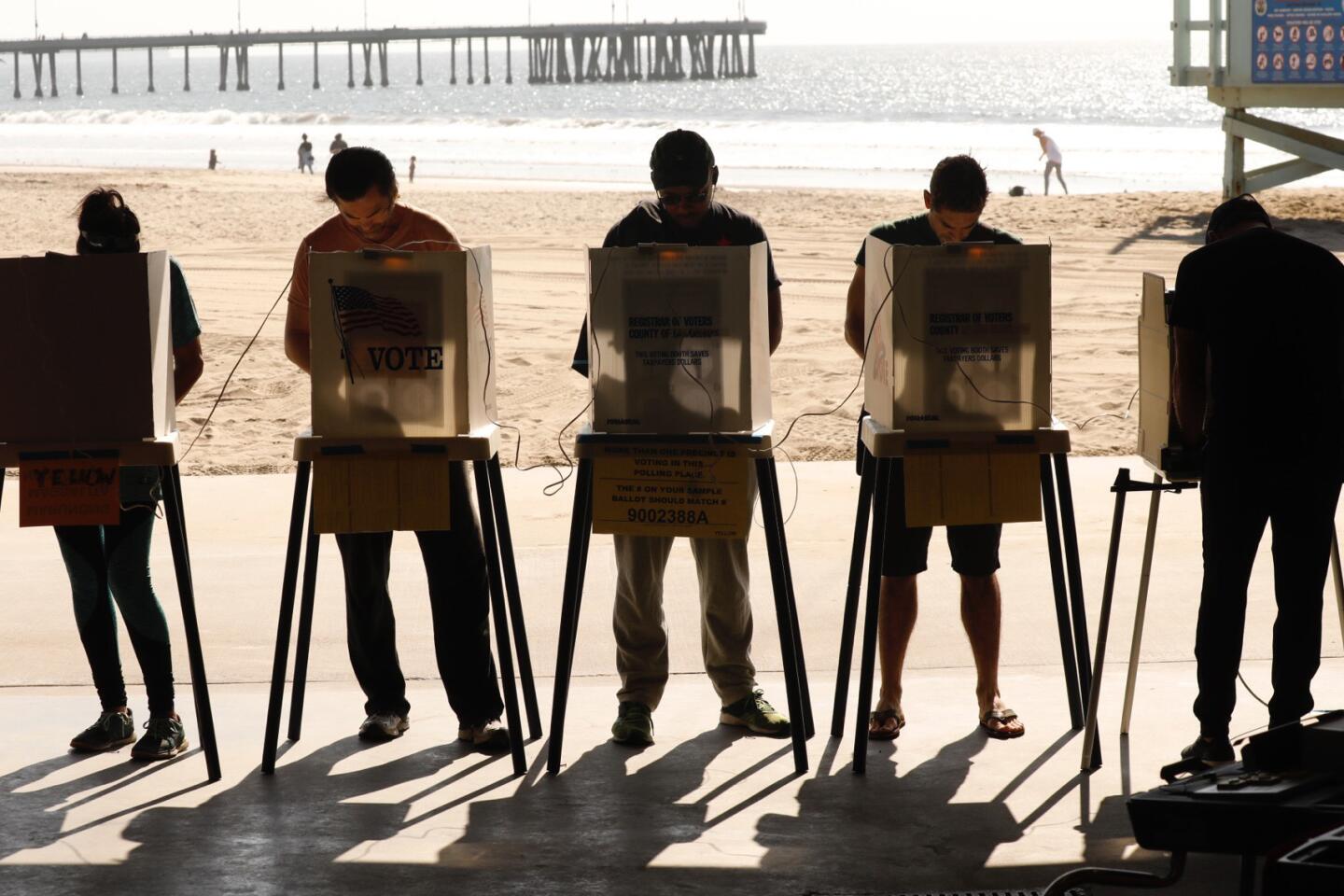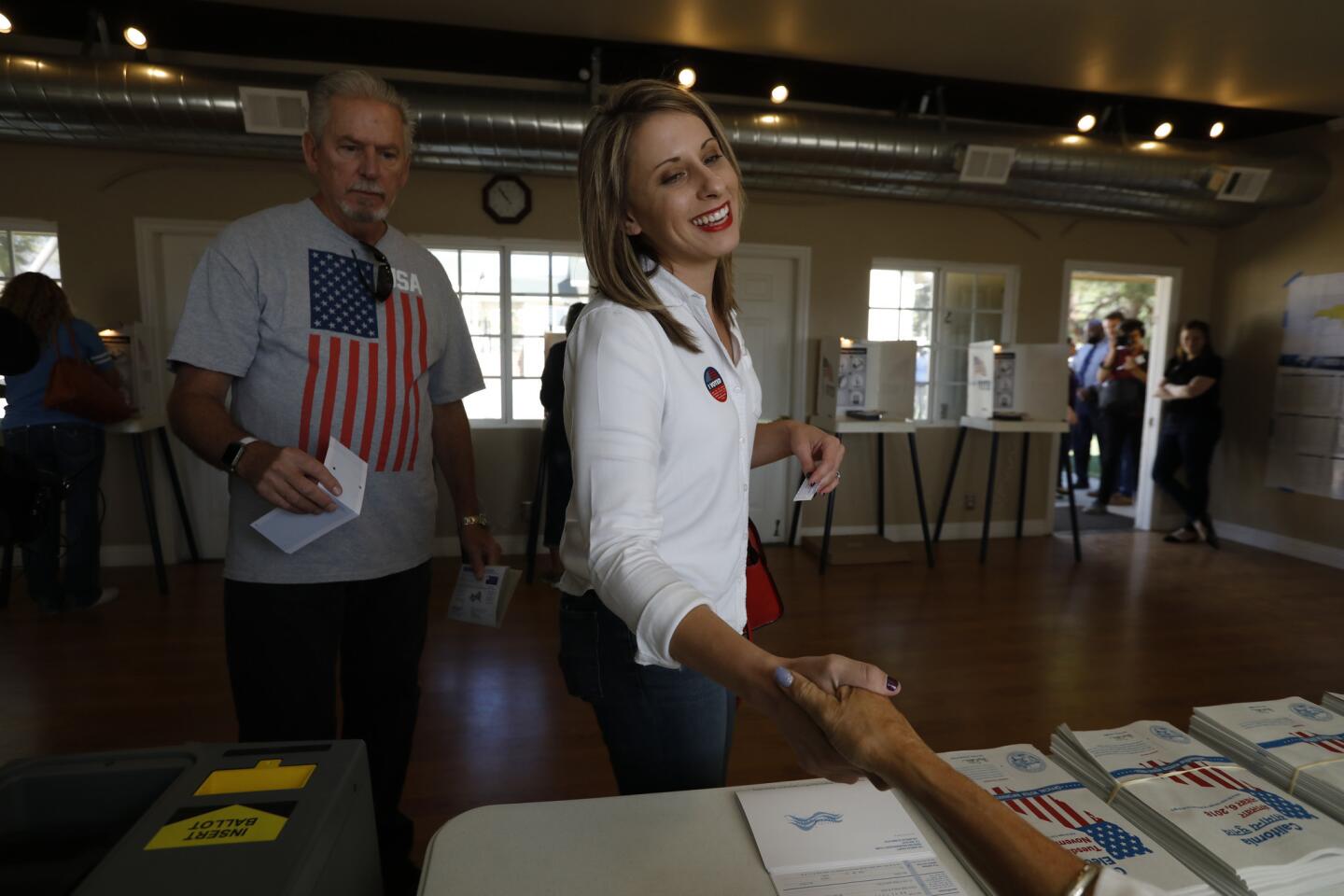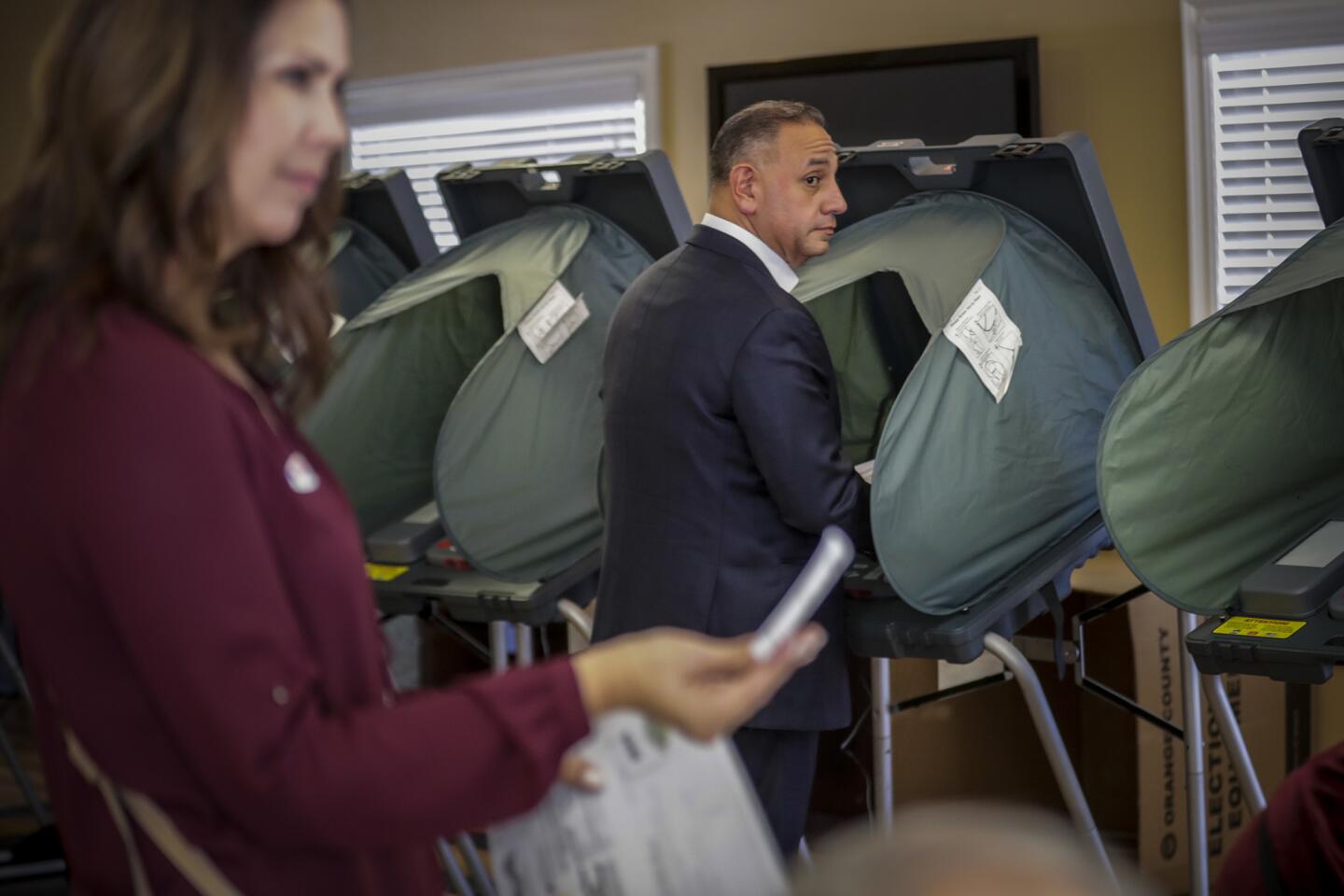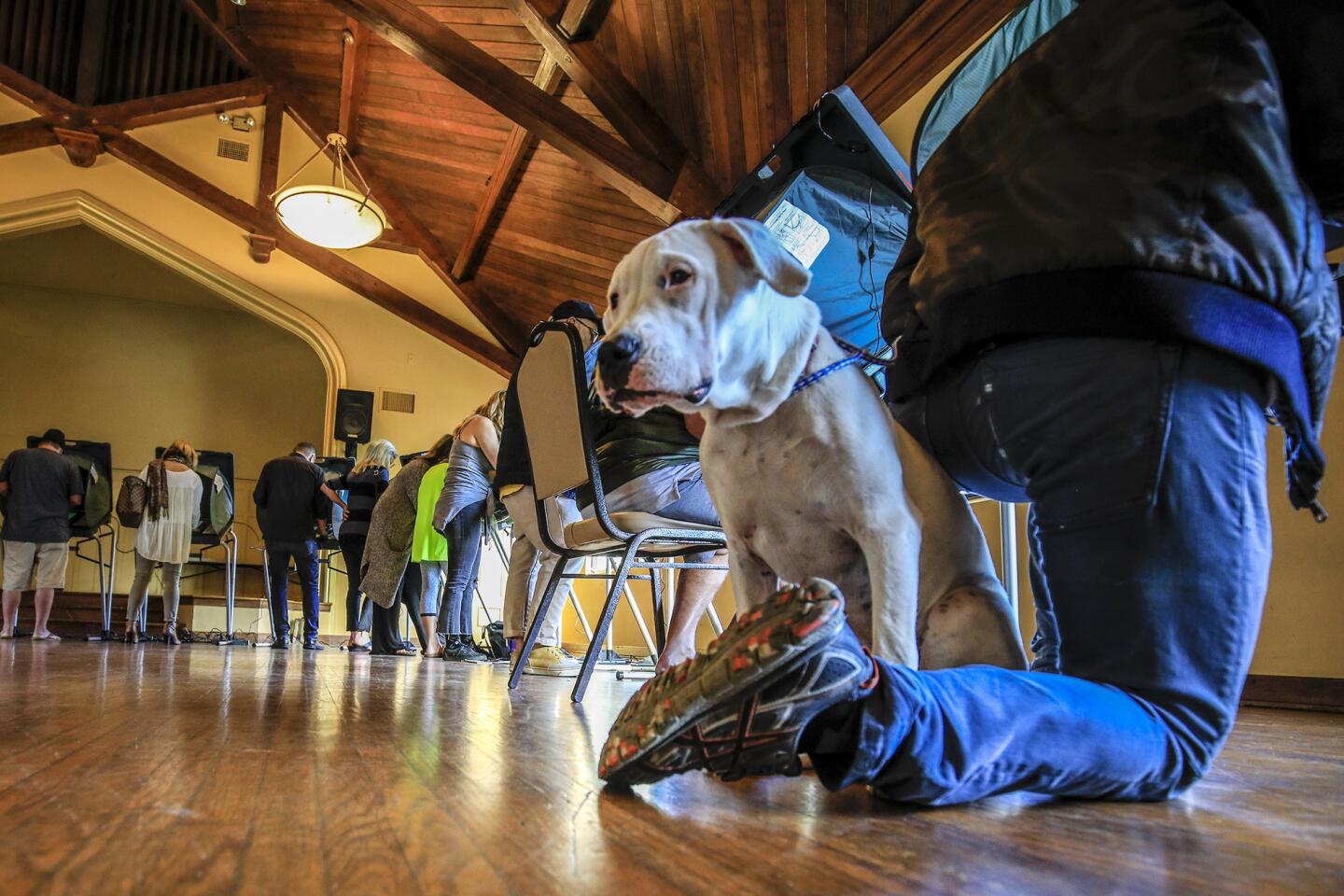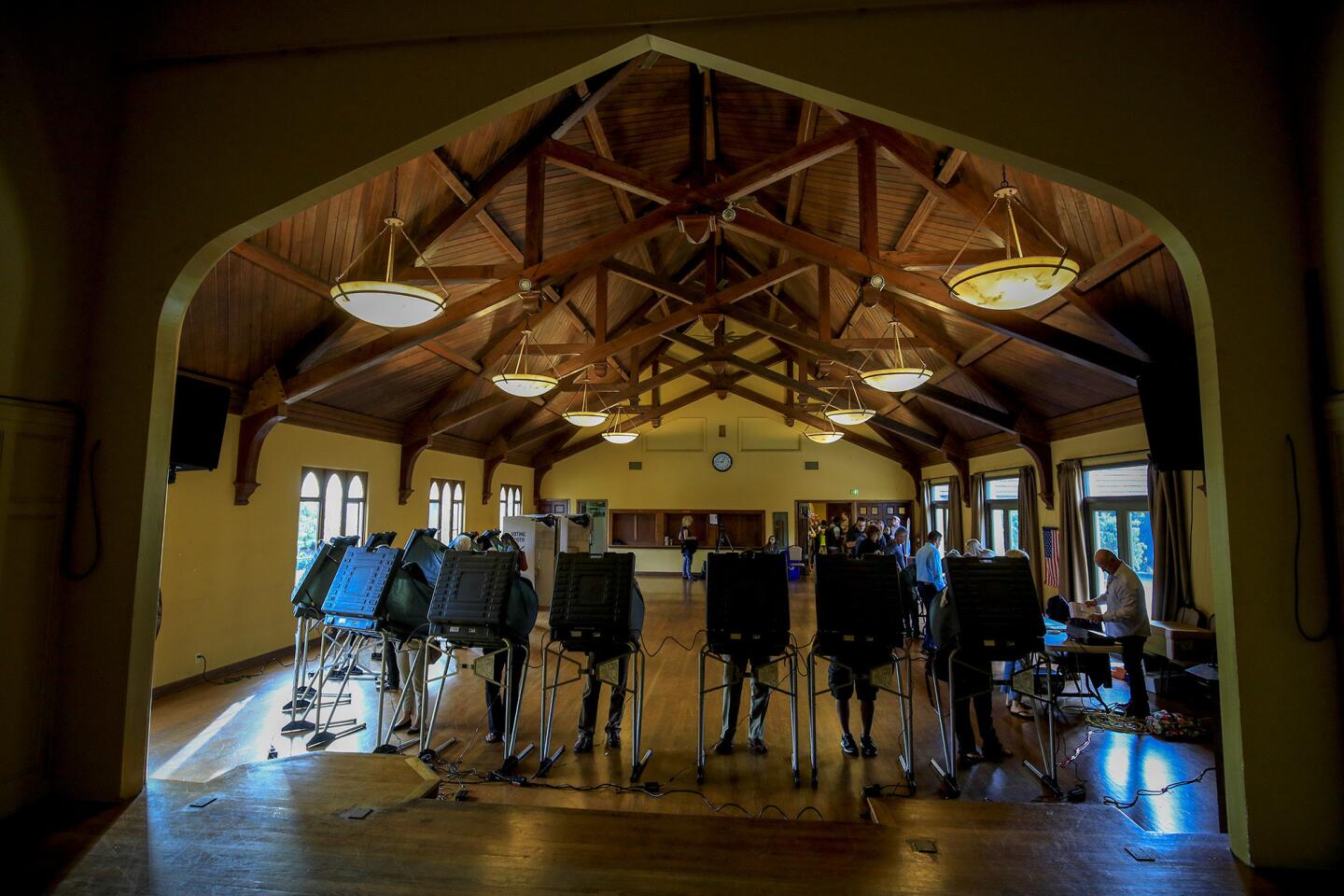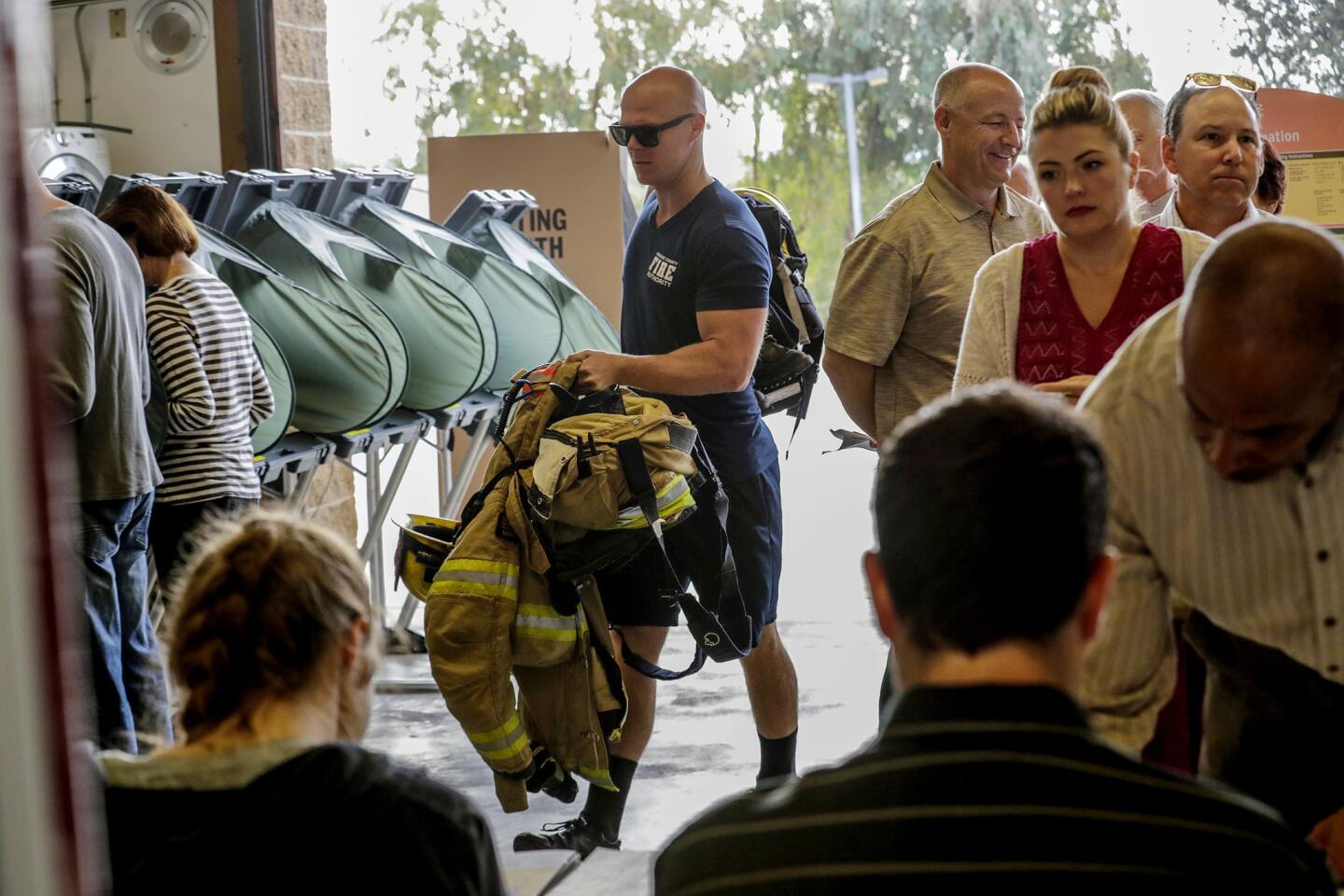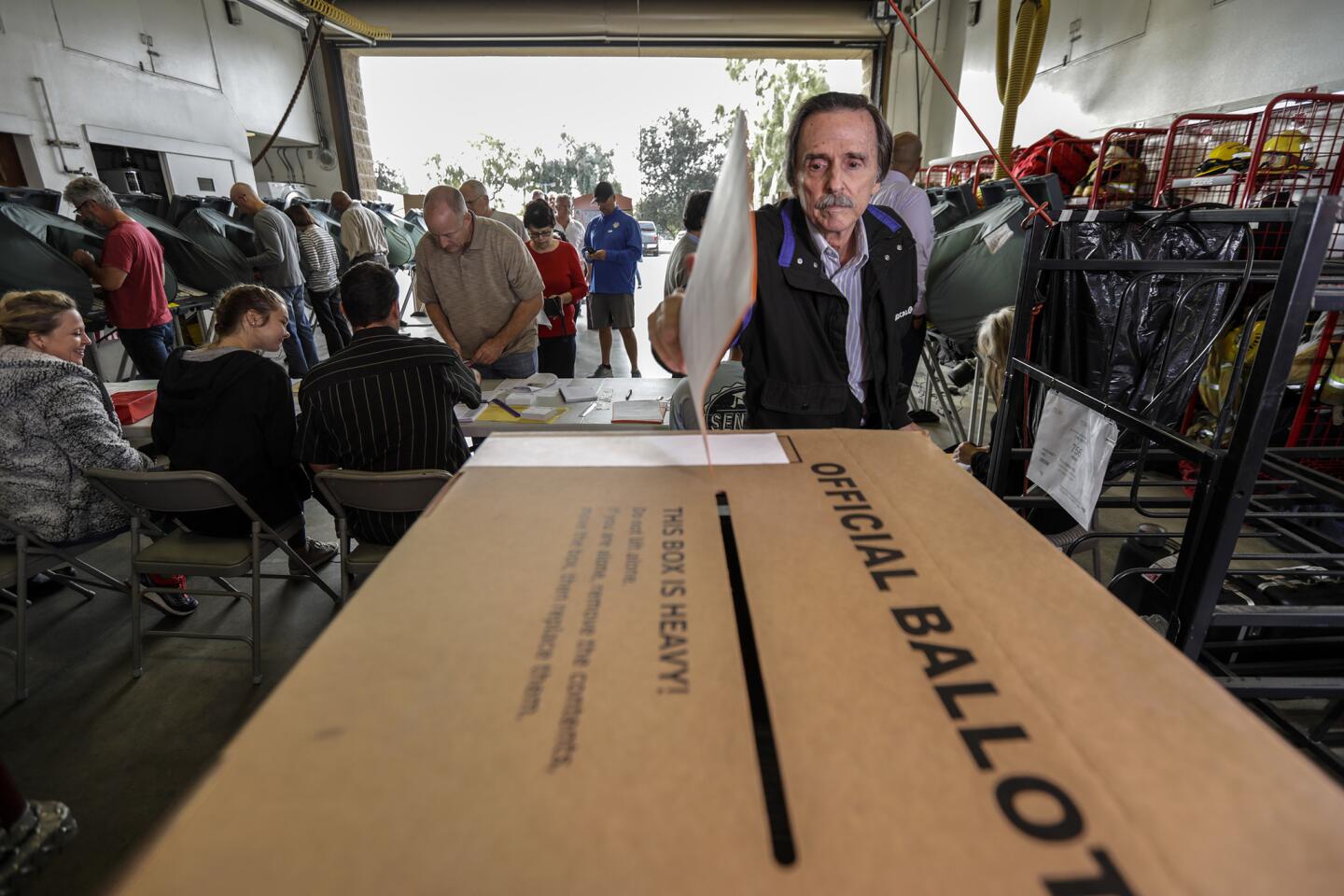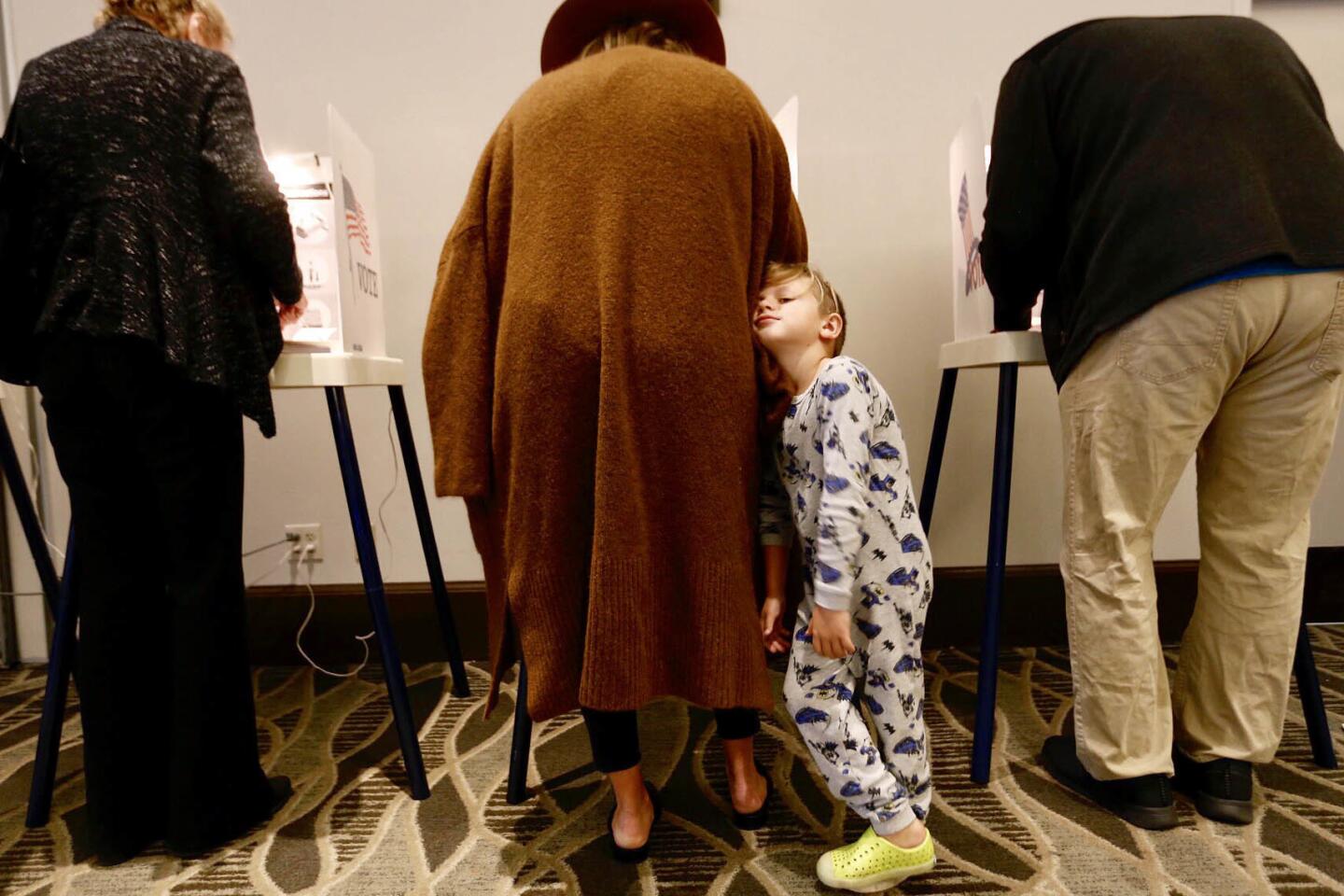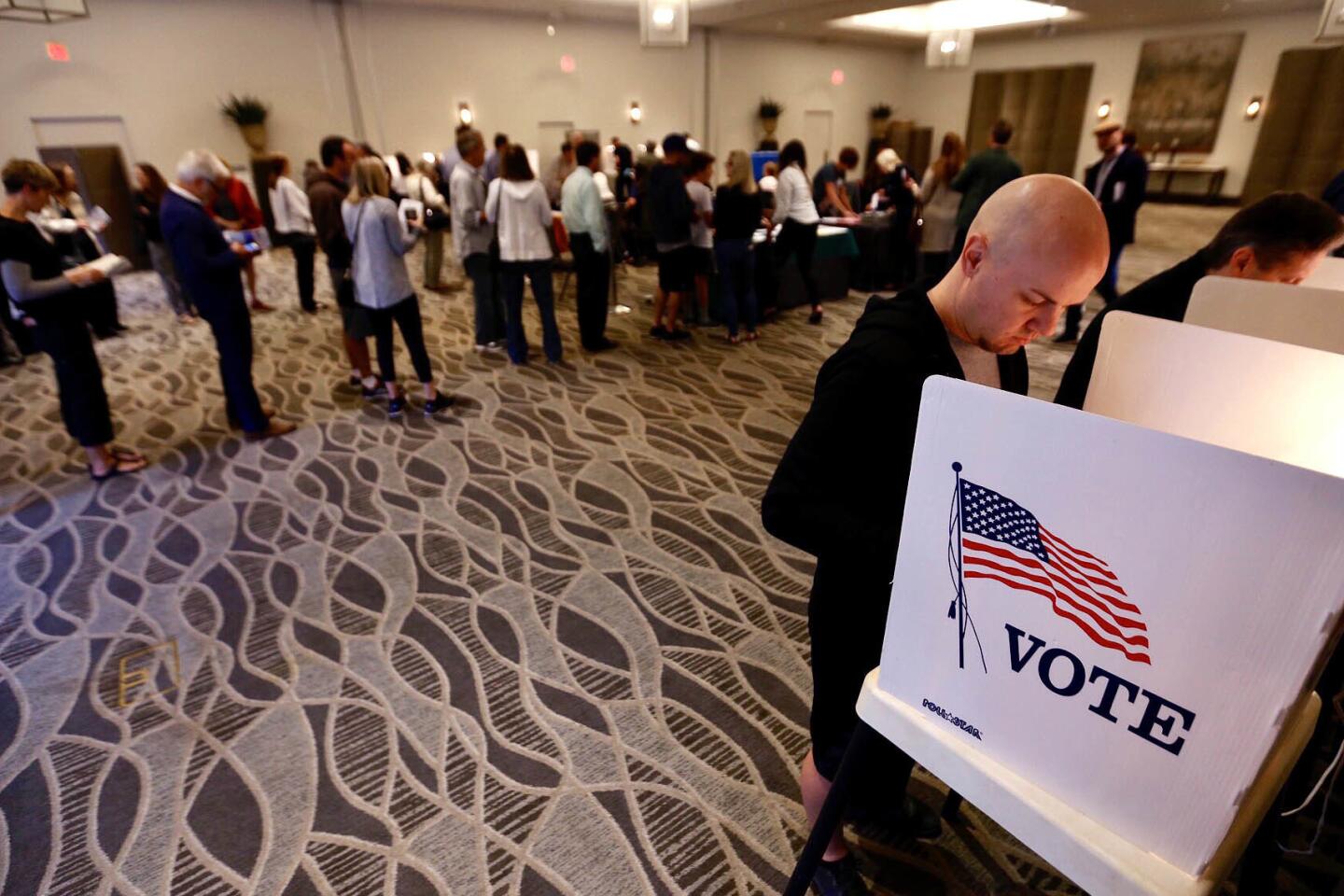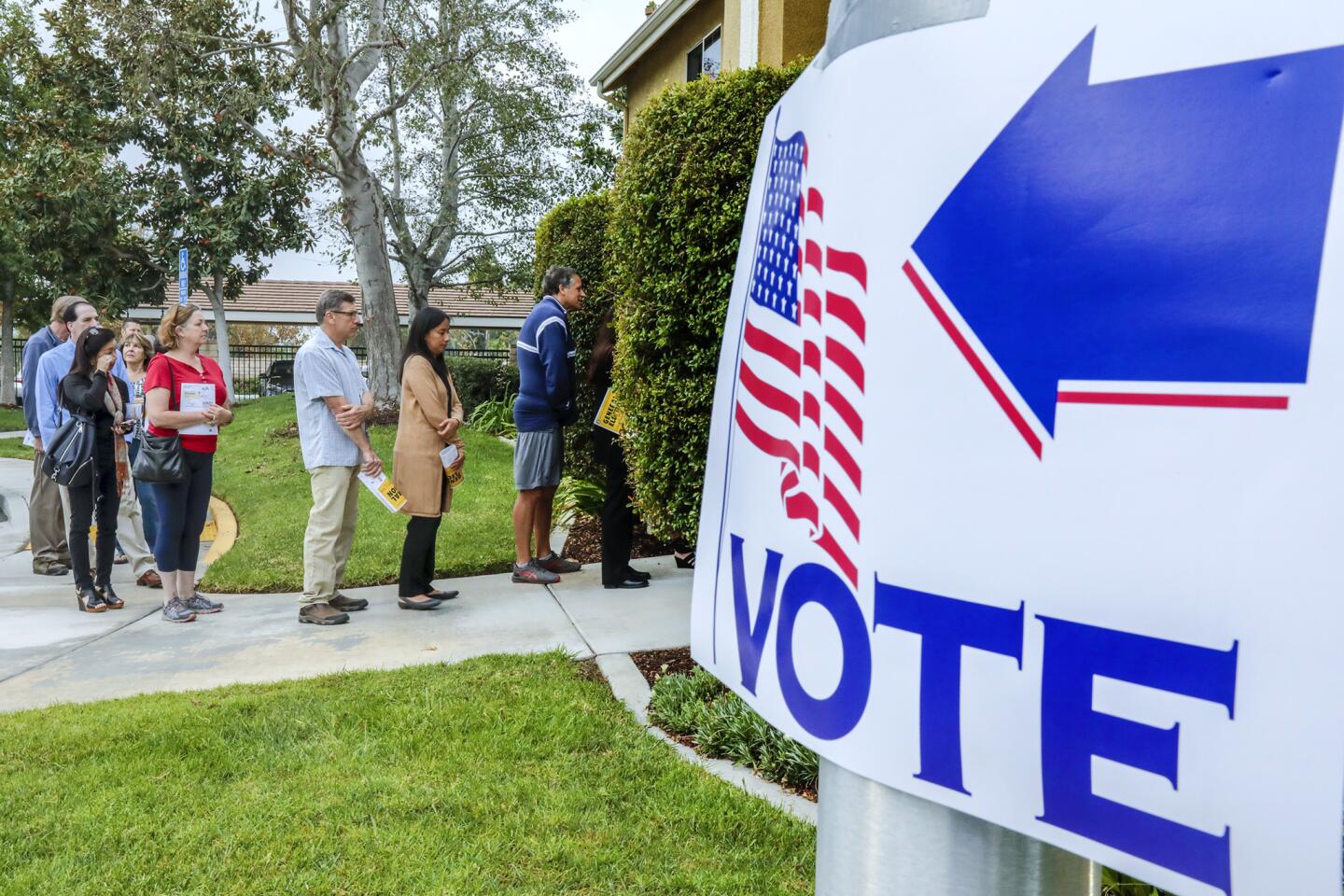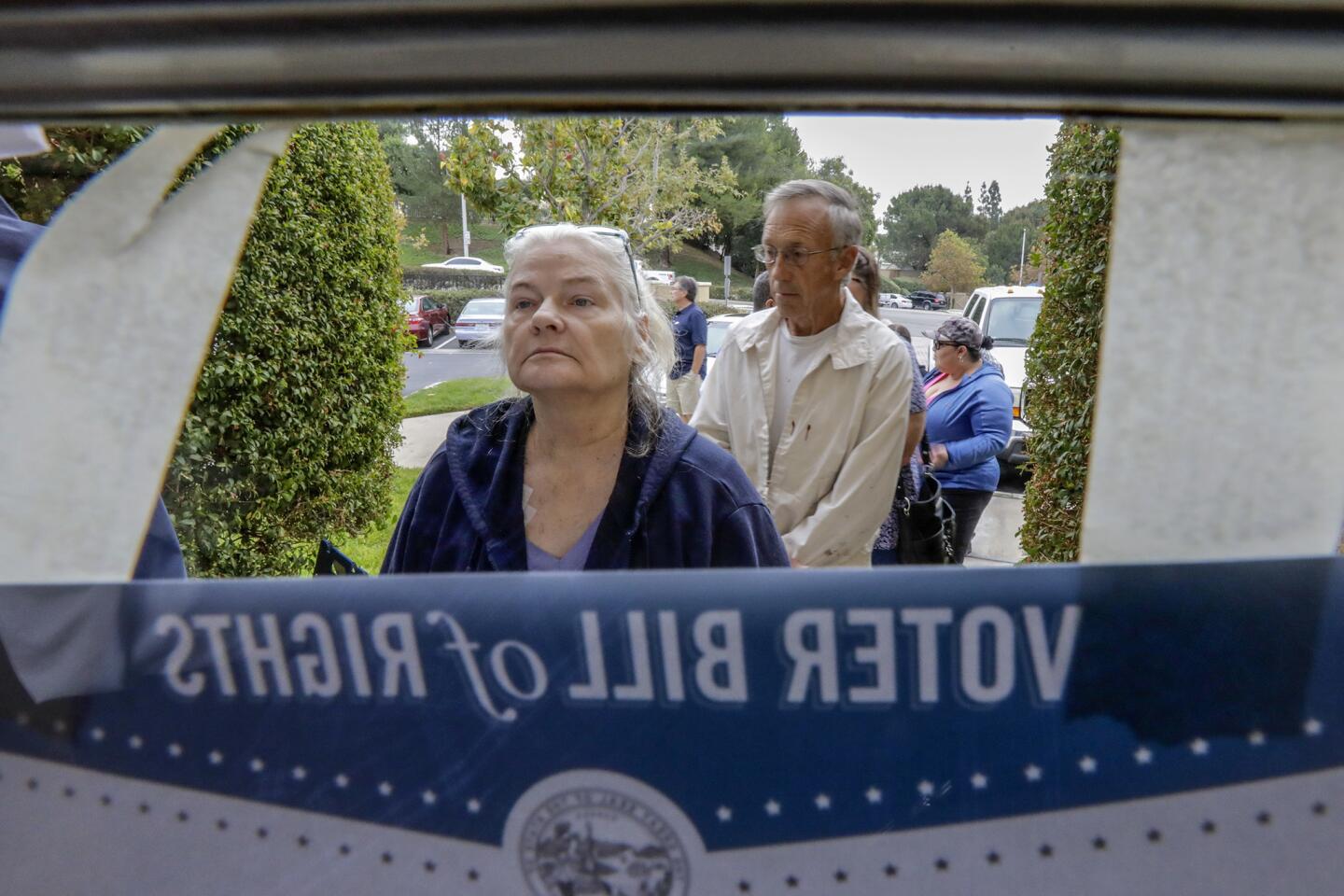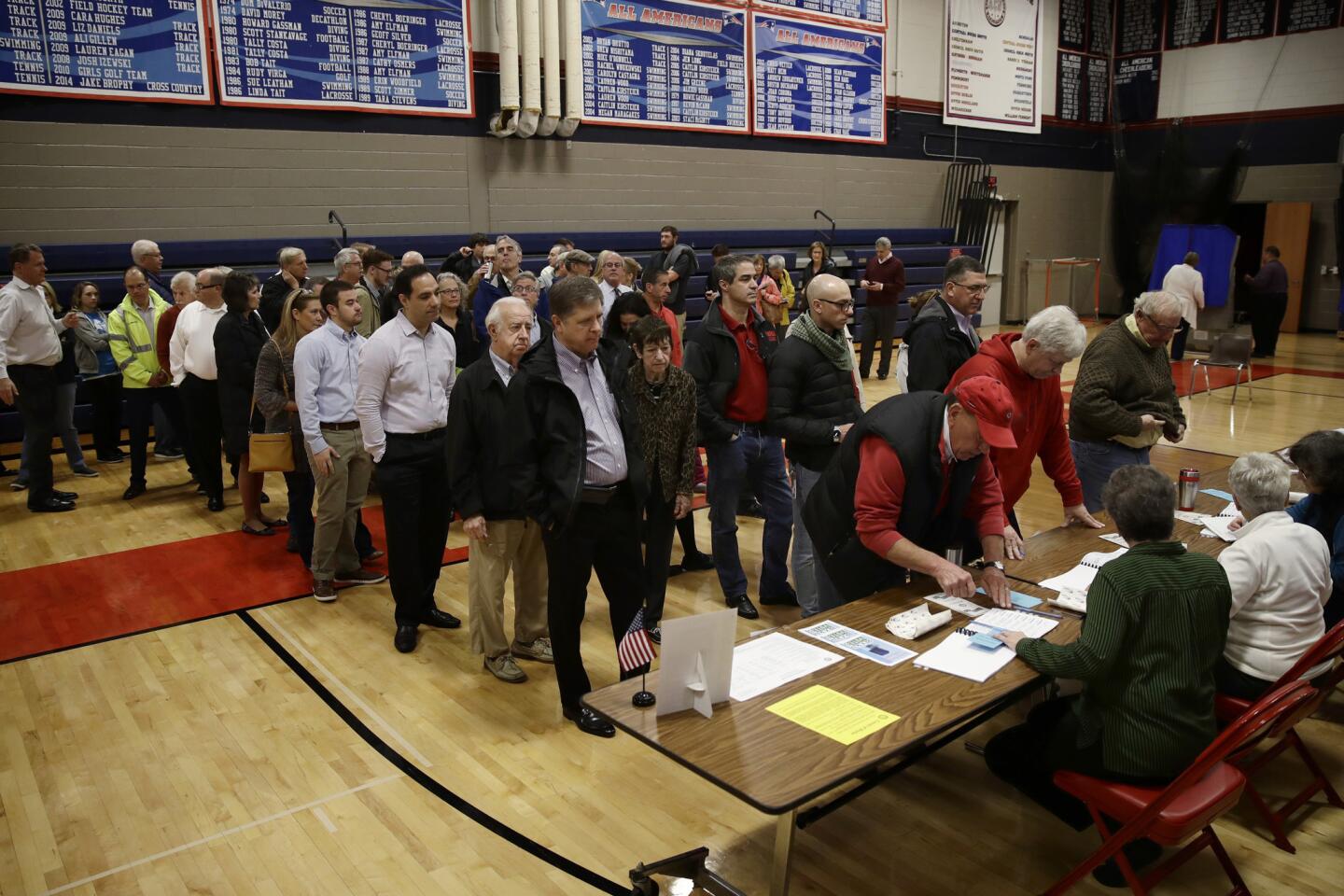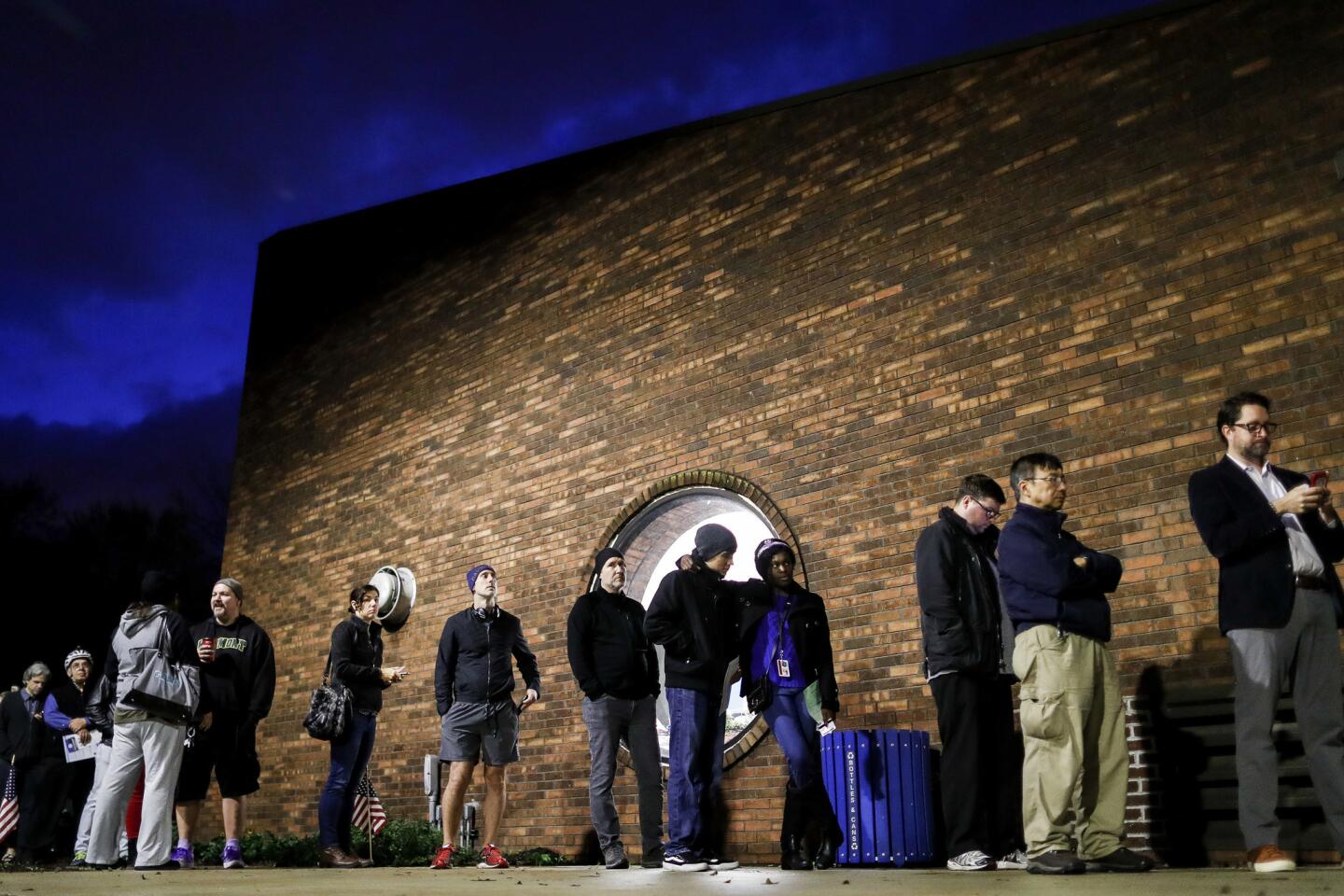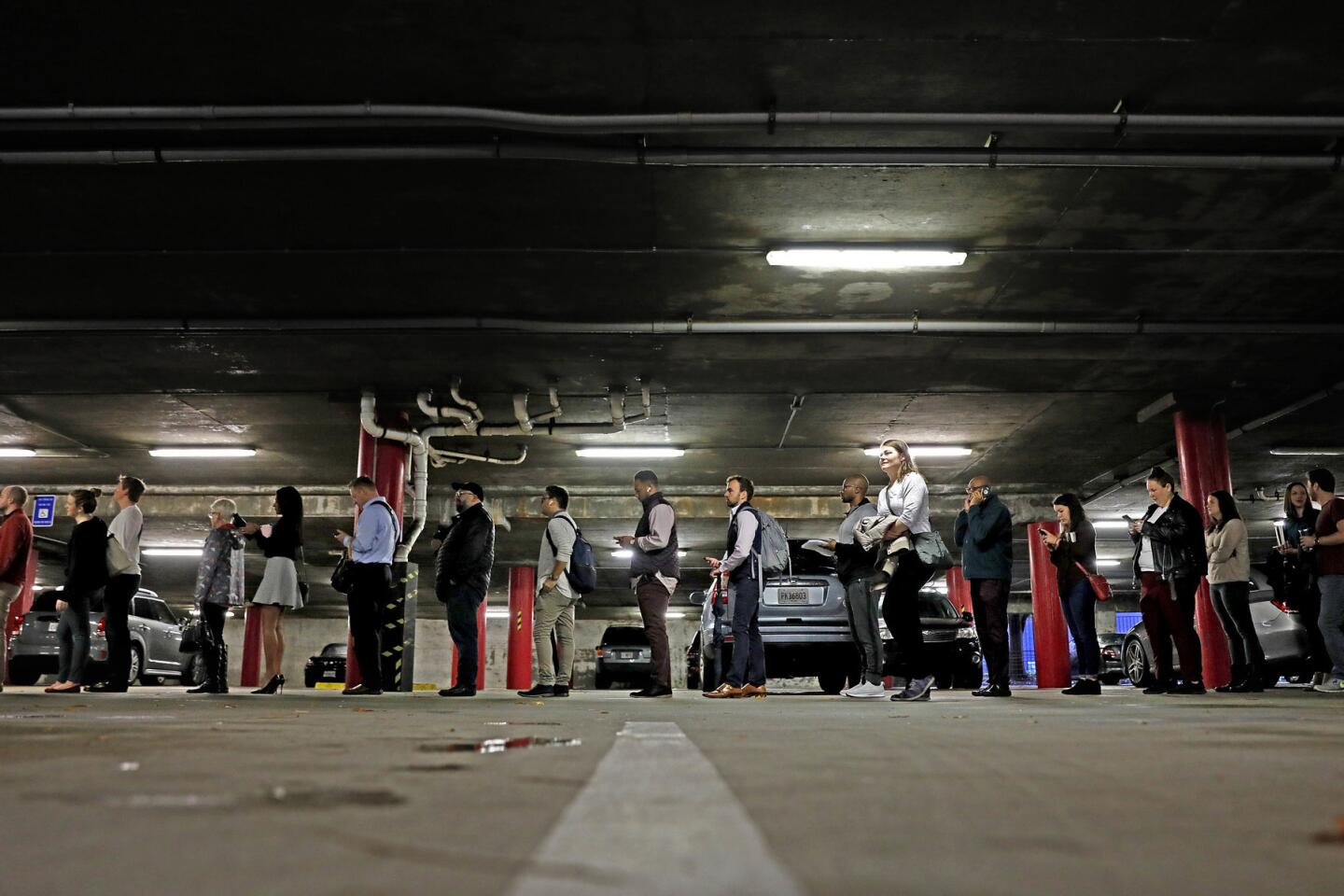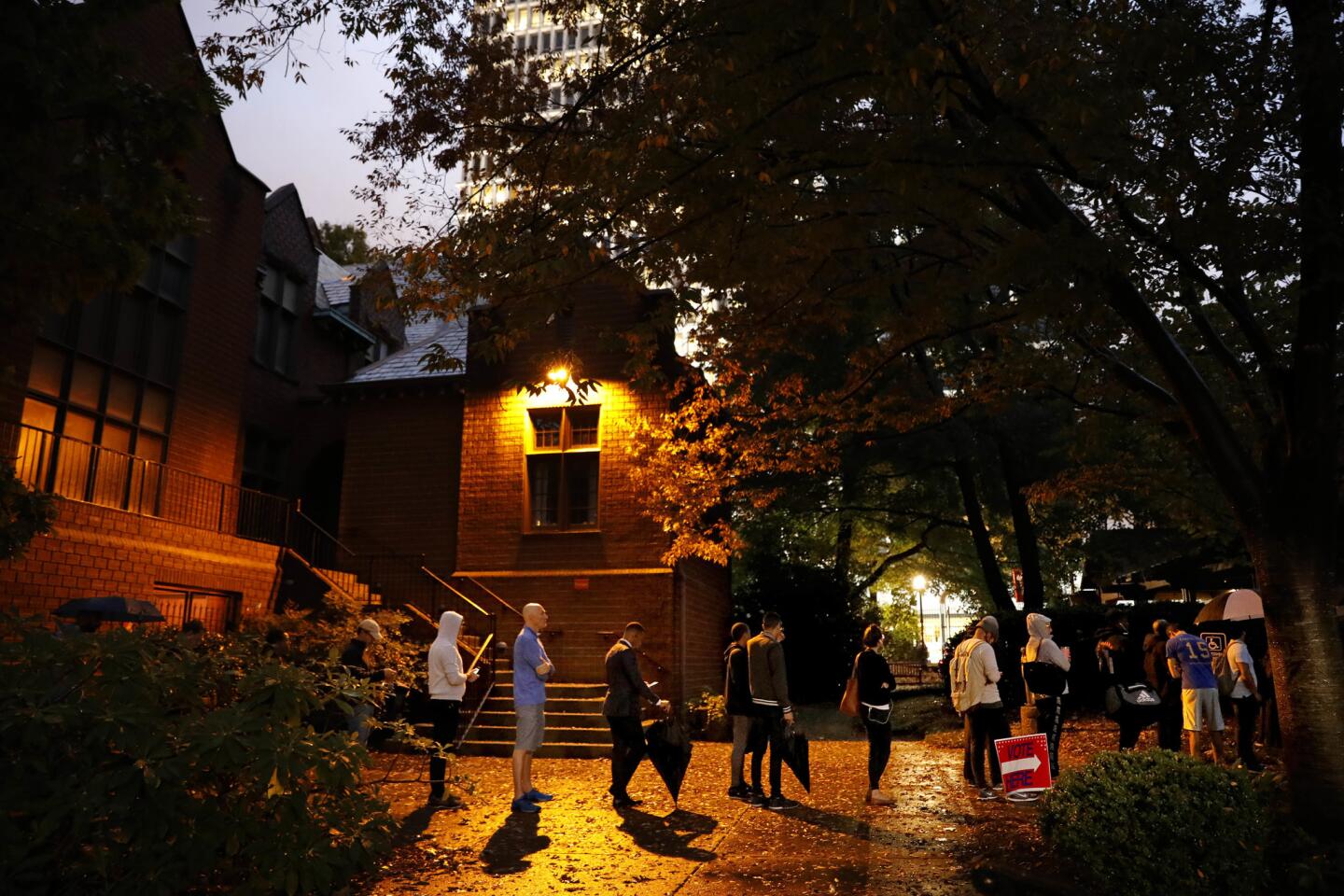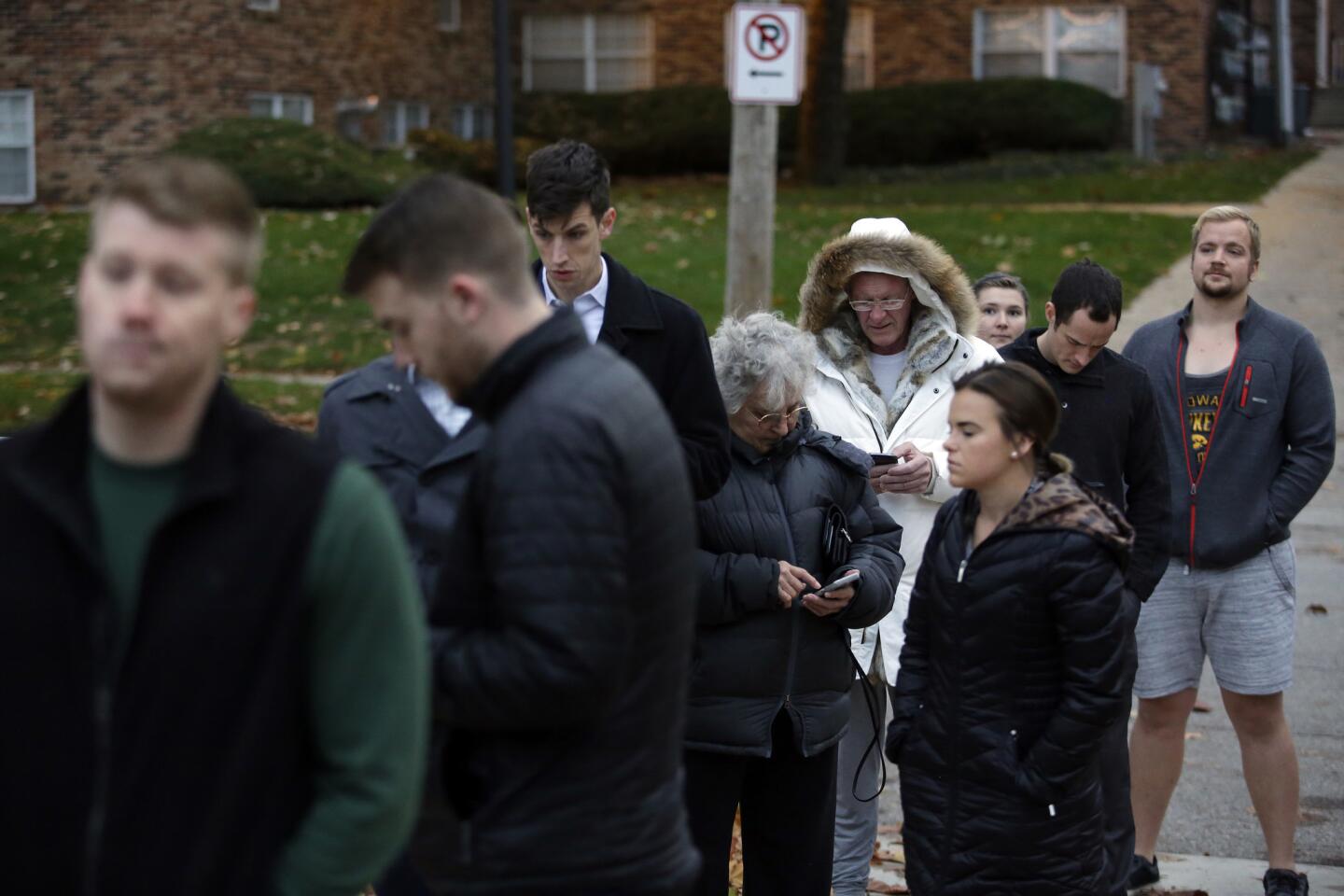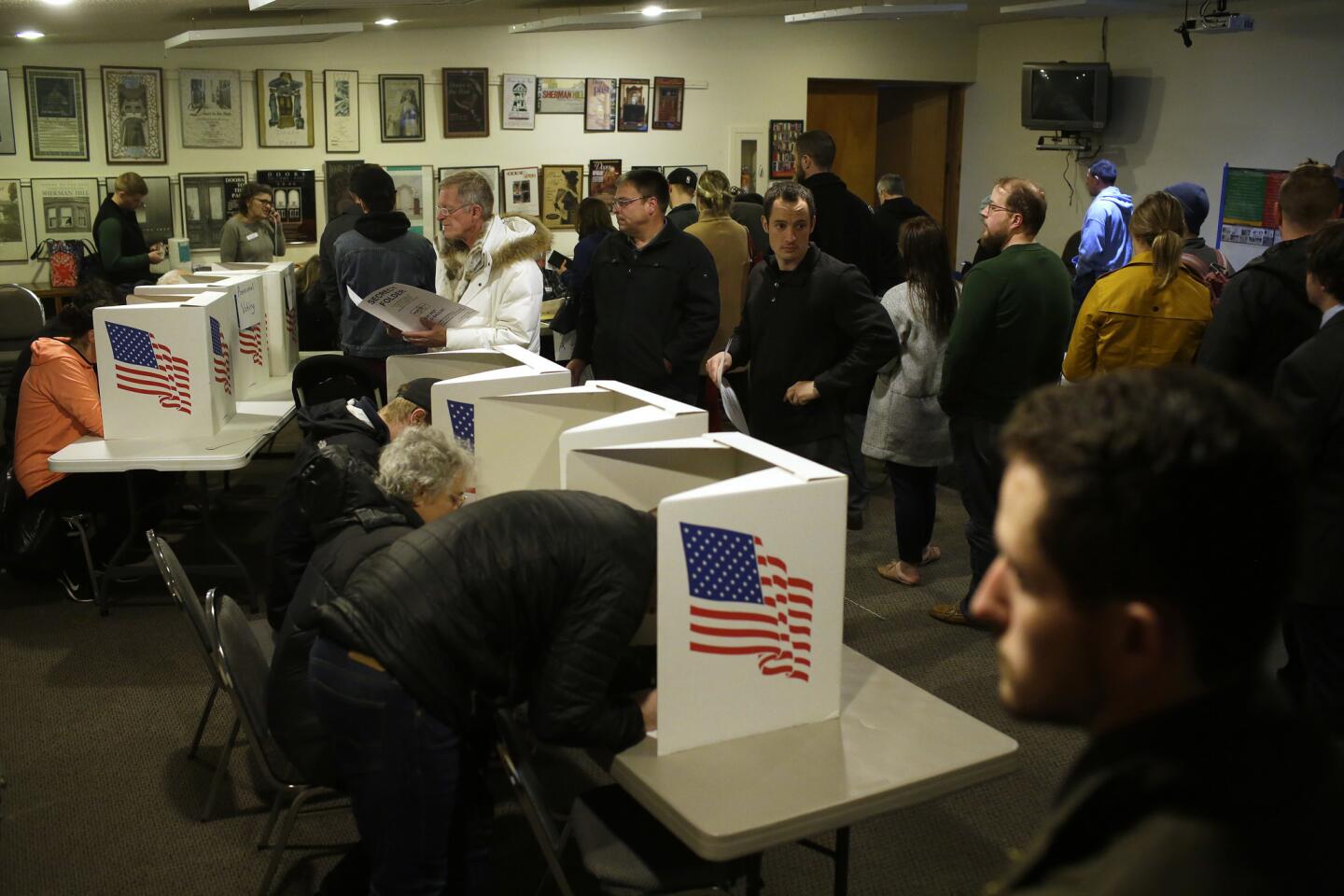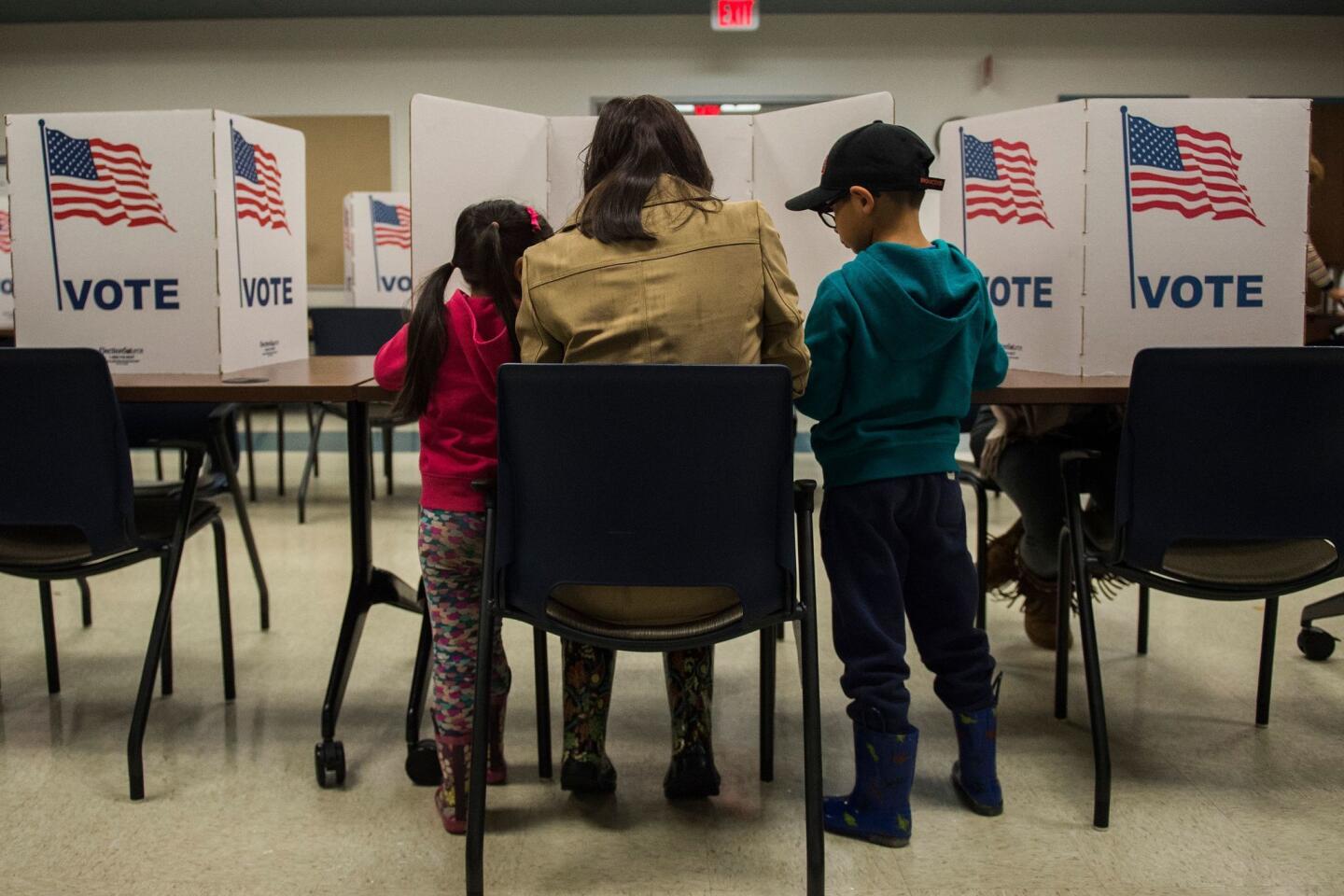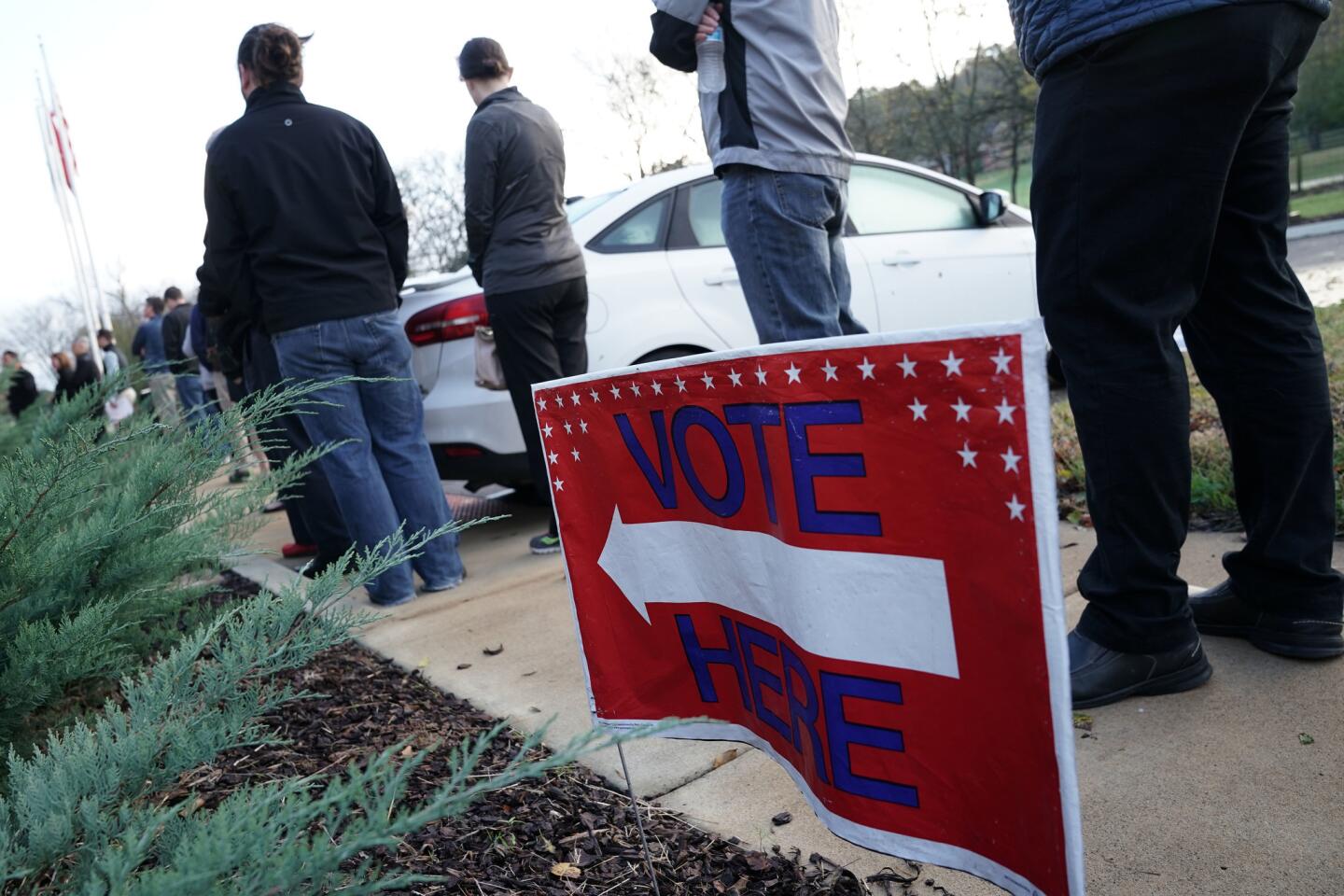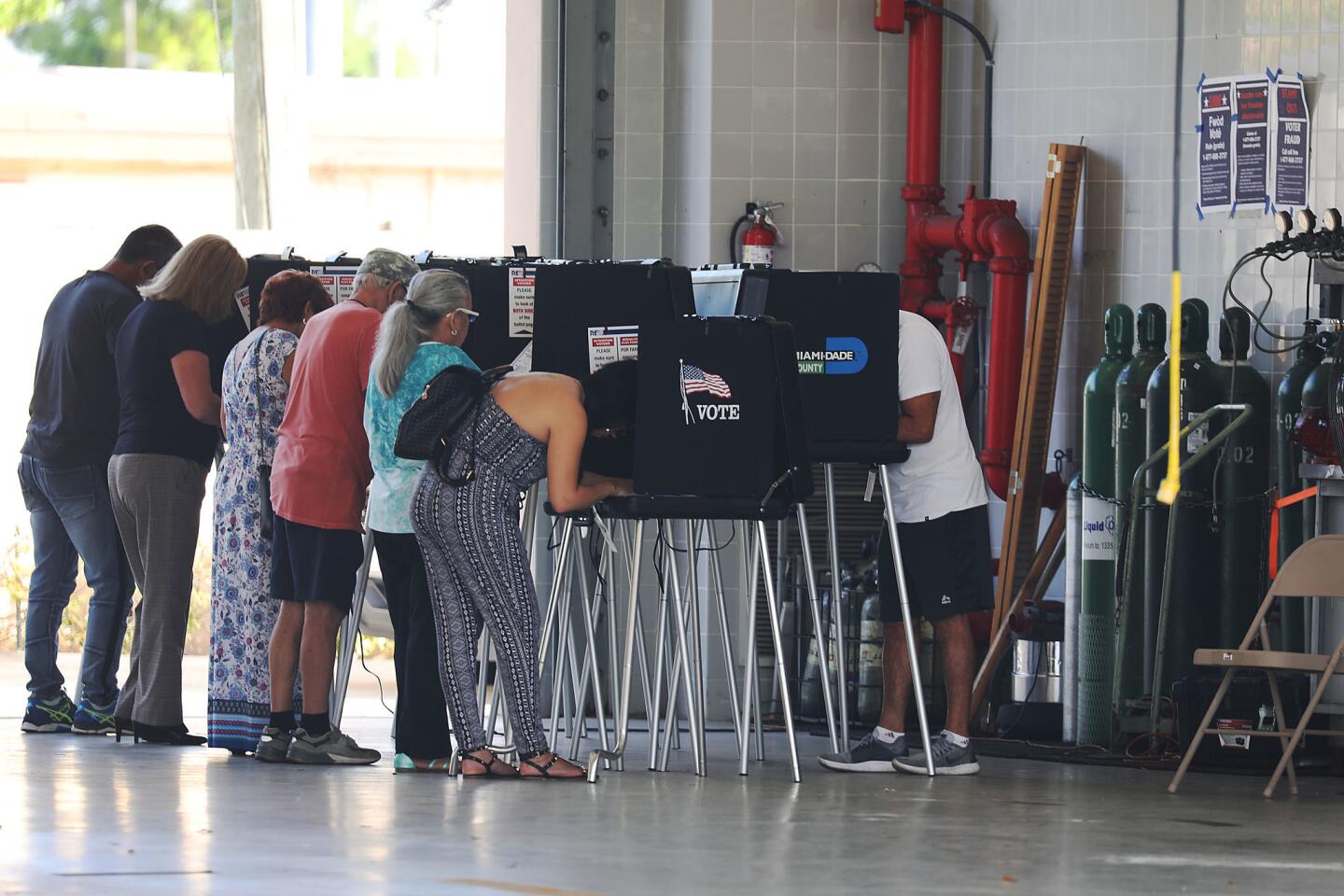Democrats seize the House and Republicans bolster Senate majority in Trump-driven midterm vote
- Share via
Democrats seized control of the House while Republicans fortified their hold on the Senate as voters stormed the polls Tuesday to render the first electoral judgment on the tumultuous presidency of Donald Trump.
Riding a familiar wave of discontent, Democratic House candidates surged to victory in blue, red and purple states alike — from New York to Oklahoma, New Jersey to Colorado, Florida to Minnesota and Texas.
The party claimed more than the 23 seats Democrats needed to take control of the chamber — the third time it has turned over in 12 years — even before results came in from California and its batch of hotly contested races.
While votes were tallied in her home state, Democratic House leader Nancy Pelosi, the front-runner to reclaim the speaker’s gavel she surrendered in 2011, took the stage at a Washington victory party to proclaim “a new day in America.”
The San Francisco lawmaker said Tuesday’s election was about “restoring the Constitution’s checks and balances to the Trump administration,” but she also reached out to the president and Republicans. “We will strive for bipartisanship with fairness for all sides,” Pelosi said, finding common ground where possible but standing “our ground where we can’t.”
President Trump, who watched the election results from the family quarters of the White House, called Pelosi to congratulate her on Tuesday’s victory.
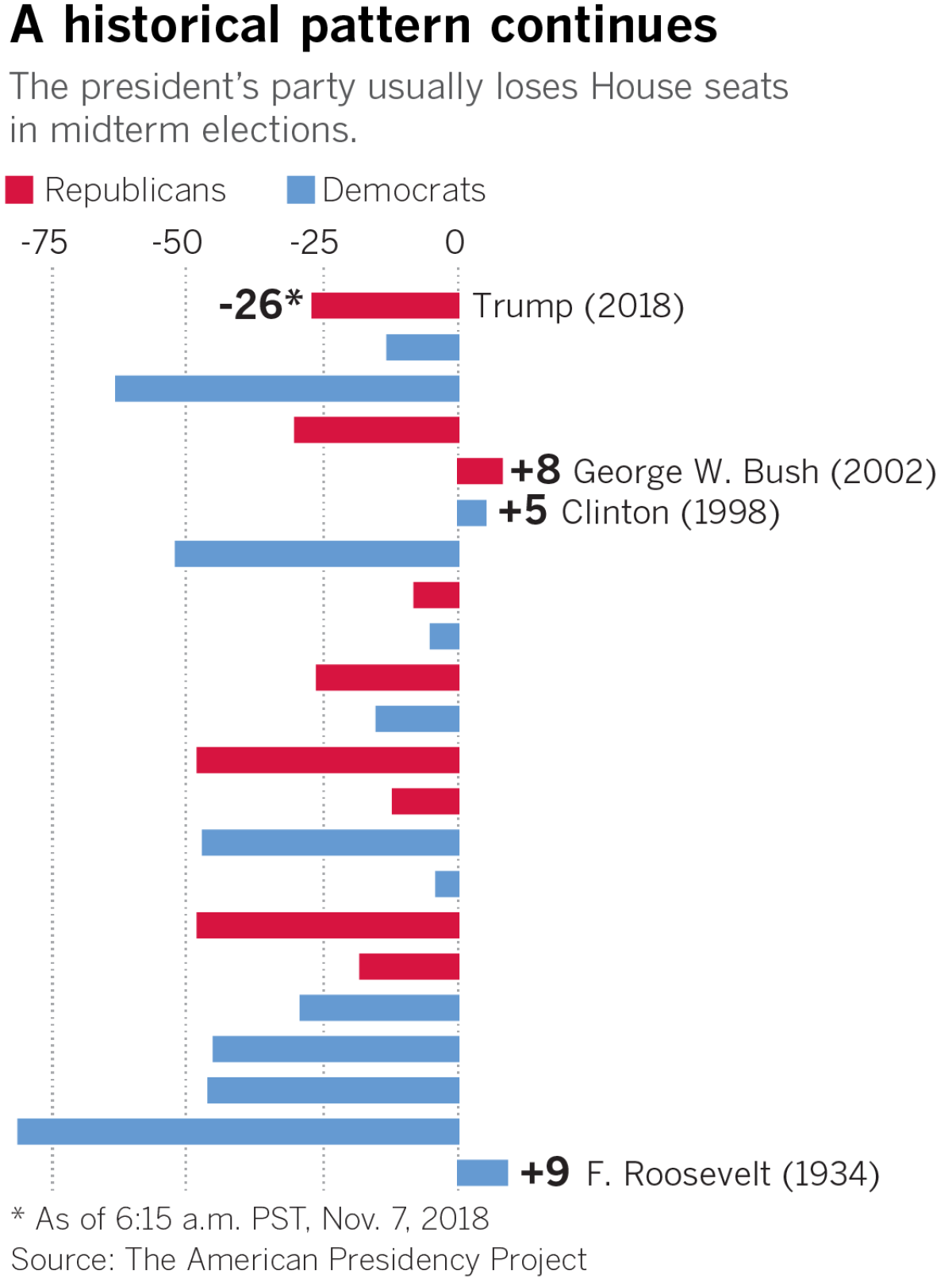
The Democratic takeover marked the fourth straight midterm election in which a chamber of Congress changed partisan hands, a level of volatility unmatched since the years after World War II and a sign of the ambivalence many voters feel toward both major parties.
Rallying from the losses they suffered under President Obama, Democrats also picked up governor’s seats in Illinois, Kansas, Maine, Michigan and New Mexico. GOP Gov. Scott Walker, who challenged Trump in the 2016 Republican primaries, was defeated in Wisconsin.
Florida went to Republicans in a squeaker typical of America’s hardest-fought and most competitive swing state. Georgia’s hotly contested race was possibly headed for a runoff.
The Senate presented a contrasting picture, reflecting the differing battlefields of Tuesday’s congressional contests as well as the country’s dual political personalities: rural red versus urban/suburban blue.
The GOP beefed up its narrow 51-49 Senate majority with victories in North Dakota, where Rep. Kevin Cramer defeated freshman Democrat Heidi Heitkamp; Indiana, where businessman and former state lawmaker Mike Braun bested first-term incumbent Joe Donnelly; and Missouri, where Atty. Gen. Josh Hawley beat two-term Democratic Sen. Claire McCaskill.
In Tennessee, Republican Rep. Marsha Blackburn defeated the state’s former governor, Democrat Phil Bredesen, to hang onto the seat of the retiring GOP incumbent, Bob Corker. Texas Sen. Ted Cruz narrowly beat back a stiff challenge from Democratic Rep. Beto O’Rourke.
All five Republicans ran as unswerving supporters of the president, who carried each of their heavily rural states by comfortable margins.
Republican Gov. Rick Scott declared victory in Florida’s Senate contest and three-term Democratic incumbent Bill Nelson conceded, but the exceedingly close margin could lead to a recount.
Democrats picked up a lone seat in Nevada — a state Hillary Clinton won — by knocking off their top target in the country, freshman Republican Sen. Dean Heller.
In West Virginia, Democratic Sen. Joe Manchin III, a prime target in a state Trump won by 40 percentage points, defeated Republican Atty. Gen. Patrick Morrisey to win his second full term. Democratic incumbents also held on in Michigan, Pennsylvania, Ohio and Wisconsin — states that were key to Trump’s 2016 victory.
“Tremendous success tonight,” the president tersely tweeted. “Thank you to all!
Although Trump was not on the ballot, he loomed large on Tuesday — the way presidents historically have in midterm elections — and many voters seized the opportunity to make their feelings known.
About two-thirds of those interviewed in exit polling said Trump was a major factor in their vote, with 40% of those saying they cast their ballots in opposition to the president and 25% expressing support.
For Republicans such as Charles Cooke, who cast his ballot in McAllen, Texas, it was a chance to deliver a big thumbs-up for the kind of non-politician he said the country needs.
“The things that have happened in the past two years are good,” Cooke said outside the Fireman’s Pumphouse polling station. “The jobs, the economy is better than ever, a lot of manufacturing, companies are coming back to the United States.”
Many, however, looked past the strong economy. Even though two-thirds of those interviewed said the economy was in good shape, according to an Associated Press exit poll, 6 in 10 said the country was nevertheless headed in the wrong direction — suggesting they weighed other factors apart from their pocketbook.
Arriving at his polling station in Fayetteville, Ga., Christy Jindra said he felt a little uneasy about his vote in the state’s fiercely fought gubernatorial race between Democrat Stacey Abrams and Republican Brian Kemp.
“I’d probably not vote for Abrams if Donald Trump wasn’t president,” the 54-year-old attorney said. “Quite frankly, the Republicans have got to be slapped down a bit.”
Jindra used to consider himself a conservative, but voted for Hillary Clinton in 2016 because he didn’t think Trump was presidential material. His opinion has not changed.
“You don’t believe anything he says,” he said. “It’s horrible.”
For the most part, the election went off with no major glitches.
There were reports nationwide of broken voting machines and confusion at polling places. But nothing out of the ordinary for election day, and many of the problems stemmed from unusually long lines, which pointed to a higher-than-usual turnout for a midterm election.
Weather also played a part. In portions of the Deep South, storm-related blackouts, including one in Knox County, Tenn., left several polling places without electricity, forcing voters there to resort to paper ballots.
Contrary to Trump’s warnings of possible nefarious acts, election officials did not report any widespread voter fraud or irregularities.
Tuesday’s balloting culminated two years of anger and political agitation, which began virtually the moment Trump took office.
Protesters flooded the streets in nationwide demonstrations the first weekend after his swearing-in, forging an army of dissenters who swelled the ranks of Democratic candidates and volunteers and filled the party’s coffers with a flood of campaign cash.
Republicans responded by rallying fiercely behind the president, overcoming any qualms about his tweets and temperament to battle critics and fight the so-called Democratic resistance.
The result was a midterm campaign that consumed and convulsed the nation like few non-presidential elections have in recent times.
“A great deal is at stake,” Pelosi told reporters during a swing last month through south Florida. “Our fundamental belief in our Constitution. The great respect we should command for everyone in our community. Fairness.”
Republicans agreed, at least as far as the import of Tuesday’s contests.
“This election is a choice between Republican results and radical resistance,” Trump told supporters at a preelection rally in Columbia, Mo. “It’s a choice between greatness and gridlock. It’s a choice between jobs and mobs.”
To a greater degree than usual, issues such as the economy, a boon to Republicans, and expanding healthcare, part of the Democratic platform, took a back seat to raw emotion.
The searing fight over Brett M. Kavanaugh’s Supreme Court confirmation deepened antagonism on both sides. Domestic terrorist attacks, including the mass shooting at a Pittsburgh synagogue and a spate of mail bombs directed at Trump’s critics, including Clinton and former President Obama, put the country on edge.
Trump heightened tensions in the final days of the campaign by focusing on the fraught issue of immigration and, in particular, a migrant caravan inching its way to the U.S.-Mexico border; it reminded both sides what they love and hate about the president.
But passion alone did not rule the election; so did the hard-and-fast realities of geography. The fight for control of the House and Senate amounted to separate and distinct contests.
In House races, the political terrain tilted heavily in Democrats’ favor, with the key battlegrounds sprinkled throughout cities and the nation’s suburbs, home to millions of female voters, college graduates, Latinos and other minorities at the vanguard of the Trump opposition.
The Senate map, by contrast, unfurled across Trump country: rural, mostly white, older and heavily conservative. Democrats were forced to defend 24 seats — 10 of them in states the president won — compared with just nine for Republicans.
The results, said Charlie Cook, a nonpartisan election handicapper, were not surprising.
“We suspected that Democrats running in very conservative, red states with large rural populations were going to have problems, and they have,” Cook said. “We knew that Republicans were going to have problems in a lot of suburban districts, even in Texas, and they have.”
Even before the polls closed, one thing seemed certain.
The country is more deeply split than it has been in years. A preelection Wall Street Journal/NBC News poll found that 90% of those surveyed believe that political division is a problem for the country. Tellingly, when asked whom they held responsible, most partisans blamed the other party.
Nothing done or said during the long, venomous campaign or in Tuesday’s results suggests attitudes will change any time soon.
Times staff writers Jennifer Haberkorn, David Lauter and Evan Halper in Washington, Molly Hennessey-Fiske in McAllen, Texas, Jenny Jarvie in Fayetteville, Ga., and Jaweed Kaleem in Los Angeles contributed to this report.
Twitter: @markzbarabak
UPDATES:
Nov. 7, 1:10 a.m.: This article was updated with further results.
12:05 a.m.: This article was updated with results Nevada and other states.
10:45 p.m.: This article was updated with further results and analysis.
9:30 p.m.: This article was updated with quotes from Nancy Pelosi and Trump offering his congratulations.
8:40 p.m.: This article was updated with Democrats taking control of the House.
8:15 p.m. : This article was updated with further political analysis
7:25 p.m.: This article was updated with the GOP padding its Senate majority, and Democrats gaining House seats.
7:10 p.m.: This article was updated with further results.
6:35 p.m.: This article was updated with results in several races.
5:35 p.m.: This article was updated with exit poll data.
4:20 p.m.: This article was updated with details on mostly smooth balloting around the country.
12:20 p.m.: This article was updated with quotes from voters.
9:50 a.m.: This article was updated with details on control of Congress.
This article was originally published at 7:35 a.m.
More to Read
Get the L.A. Times Politics newsletter
Deeply reported insights into legislation, politics and policy from Sacramento, Washington and beyond. In your inbox three times per week.
You may occasionally receive promotional content from the Los Angeles Times.
